AUCD4all: Celebrating Leadership in Civil Rights
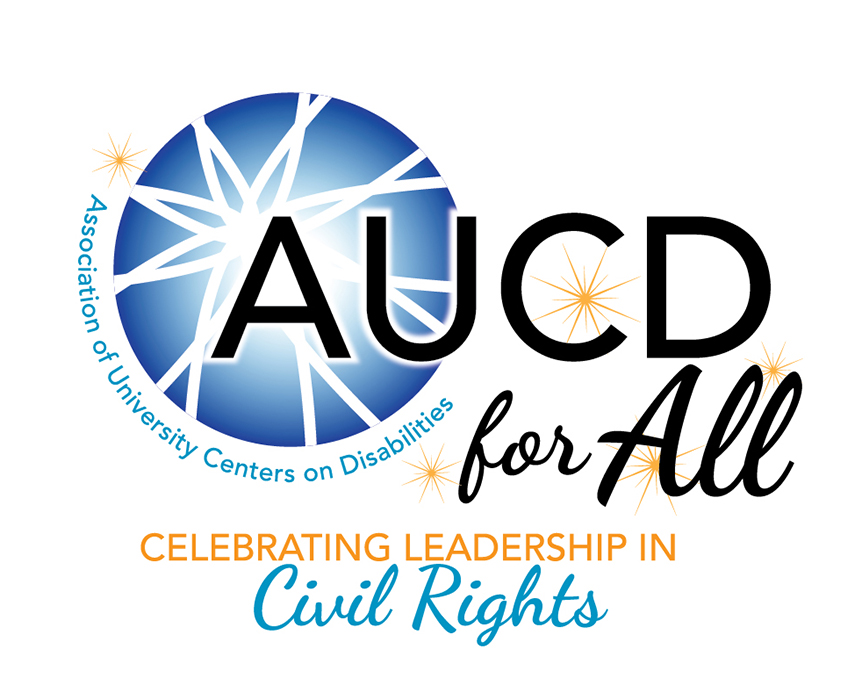 For AUCD centers and programs across the country, the core civil rights vision of the ADA and other disability rights laws informs the approach we take to improving the lives of children and adults with disabilities and their families. This vision begins with the idea that disability is a natural part of the human experience, that self-determination and community integration are fundamental human rights, and that everyone should be able to participate fully in their communities and be treated with dignity and respect.
For AUCD centers and programs across the country, the core civil rights vision of the ADA and other disability rights laws informs the approach we take to improving the lives of children and adults with disabilities and their families. This vision begins with the idea that disability is a natural part of the human experience, that self-determination and community integration are fundamental human rights, and that everyone should be able to participate fully in their communities and be treated with dignity and respect.
Select a pin on the map below to read one of the many examples of how AUCD network members across the country and territories lift up civil rights and social justice for people with disabilities and their families. From Olmstead enforcement and settings rule implementation, inclusive early childhood and K-12 education and employment, guardianship reform and the right to communicate, inclusive higher education and improving access to technology, transportation and housing, you’ll see how the AUCD network at its core strives to protect and promote the civil rights of children and adults with disabilities for people with disabilities and their families.
Read Stories of how the Following AUCD Network Centers Work to Advance the Civil Rights of People with Disabilities
Changing Perspectives, Creating a More Accessible Arkansas
University of Arkansas - Partners for Inclusive Communities; Little Rock, AR
Disability is an aspect of diversity. Access is a matter of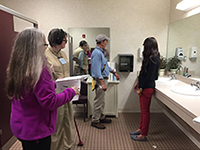 social justice. These values are central to the mission of Partners for Inclusive Communities and to the work of several projects that fall under the umbrella of Initiatives on Access and Justice. At the foundation of the work of these projects is the recognition that true change happens when people have a shift in perspective and have the tools to do things differently. Partners staff are working to help stakeholders to:
social justice. These values are central to the mission of Partners for Inclusive Communities and to the work of several projects that fall under the umbrella of Initiatives on Access and Justice. At the foundation of the work of these projects is the recognition that true change happens when people have a shift in perspective and have the tools to do things differently. Partners staff are working to help stakeholders to:
- view disability through the lens of diversity
- see access as a civil right, and
- gain the tools for creating more accessible and inclusive environments.
Seeing Disability Through a New Lens - Changing how disability is viewed in society has the potential to have a huge impact-from reducing violence to increasing employment opportunities. This emphasis is woven throughout these projects. Project staff have provided a presentation entitled ‘Seeing Disability Through a New Lens' to park and museum professionals, victim service providers, vocational rehabilitation staff, and university personnel. Two series of memes were created and shared widely through the Safety and Sexual Violence Prevention Project (funded by the Arkansas Commission on Child Abuse, Rape and Domestic Violence).
Viewing Access as a Civil Right - A shift in thinking about access as a matter of civil rights rather than a charitable act also has the potential of resulting in a higher commitment to providing access. As the Arkansas' Regional Affiliate of the Southwest ADA Center, Partners for Inclusive Communities works to expand knowledge of the ADA and related civil rights legislation. This collaboration began in 2016 with the Southwest ADA Center, a program of Independent Living Research Utilization funded through a grant (#90DP0092) from the National Institute on Disability, Independent Living, and Rehabilitation Research. The project focuses on increasing the capacity of Arkansas agencies to improve access to people with disabilities. Project staff provide training and technical assistance across the state. Through the creation of an ADA Leadership Coalition, project staff hope to provide knowledge and tools to future disability advocates.
Creating More Accessible Environments - Once people shift their thinking regarding disability and access, they need the skills to create more accessible environments. Also through the Southwest ADA Center Regional Affiliate - Arkansas, a nationally known presenter provided four workshops on access and the built environment, allowing participants to learn about the ADA Accessibility Guidelines and engage in hands-on activities to apply their knowledge. Project staff also provide workshops on digital access and on creating accessible environments to organizations across the state. Exploreaccess.org offers resources for creating more accessible environments. One example is a toolkit called ‘Access to Mental Health' which provides mental health professionals with guidance on removing barriers to their services.
The Future - These efforts have created a momentum that has resulted in increasing numbers of requests for training and technical assistance. Partners staff look forward to meeting the challenge of creating a world where disability is seen as a matter of diversity and access as a matter of social justice.
Despite a Border Wall, a Cross-border Collaboration Unites People Assisting Individuals with Disabilities
Sonoran UCEDD; Tucson, AZ
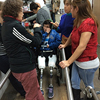 A 2008 survey conducted by the Sonoran University Center for Excellence in Disabilities at the University of Arizona and Desarrollo Integral de la Familia (DIF) in Nogales, Mexico, focused on identifying issues impacting the border community of Nogales, Sonora, Mexico. The results indicated social isolation, problematic schooling, and unemployment associated with a lack of wheelchairs durable enough to navigate the rough terrain, lower limb prosthetics, and hearing aids with re-chargeable batteries; medical devices that were not available or unaffordable to many people. The response: the ARizona SOnora BOrder Projects for Inclusion (ARSOBO) was established to provide medical devices that would be made by individuals who need and use the same device, to alleviate barriers and enhance the potential of people with disabilities.
A 2008 survey conducted by the Sonoran University Center for Excellence in Disabilities at the University of Arizona and Desarrollo Integral de la Familia (DIF) in Nogales, Mexico, focused on identifying issues impacting the border community of Nogales, Sonora, Mexico. The results indicated social isolation, problematic schooling, and unemployment associated with a lack of wheelchairs durable enough to navigate the rough terrain, lower limb prosthetics, and hearing aids with re-chargeable batteries; medical devices that were not available or unaffordable to many people. The response: the ARizona SOnora BOrder Projects for Inclusion (ARSOBO) was established to provide medical devices that would be made by individuals who need and use the same device, to alleviate barriers and enhance the potential of people with disabilities.
Since 2012, the following have been accomplished.
- Over 450 RoughRider all-terrain wheelchairs have been made, one-third of which were customized for children with disabilities. In addition to Nogales, chairs have been sent to Brazil, Guatemala, Honduras, Tanzania, Peru, France, and other cities in Mexico (Baja, Hermosillo, Obregon).
- Two unemployed individuals each with an amputated leg have been trained to fabricate prosthetics and secure employment. With their new skills, prosthetics no longer need to be fabricated in Tucson, cutting the time from measurement to fitting from two months to 3 days.
- More than 350 individuals now have a prosthetic leg and can get out of their wheelchairs and walk without crutches.
- Over 750 adults and children have been fitted with high quality hearing aids.
- Elders are able to hear, engage in conversation, and re-enter society; children with a hearing impairment are able to hear their mothers' voice for the first time.
- One employee with both legs amputated was isolated at home. He began volunteering at ARSOBO, learned a skill enabling him to construct wheelchairs for others, and got a job.
- A 20-year old woman who had complications from a systemic infection resulting in amputation of both hands and both legs above the knees, when first seen at ARSOBO, complained to her mother: "I'm tired of this wheelchair, I want to go to college." Bilateral leg prosthetics and 3D computerized hands with flexible digits were made. She is now married, has a child, and is enrolled in on-line college courses.
- A 10-year old boy born with congenital amputation of both legs above the knees was fitted at age four with legs without knees at Shriners in CA. Six years later he was seen at ARSOBO when it was learned that due to his short stature and stiff-legged gait, kids at school called him ‘little robot boy'. The technician asked how tall he would like to be. Prosthetic legs with an added 10 cm and flexible knees were fabricated. The story appeared in the local Sunday paper and classmates came asking for his autograph. He is no longer ‘robot boy', has a girlfriend, and is now outside playing soccer.
Partners: Sonoran UCEDD; DIF (Desarrollo Integral de la Familia); Hanger Prosthetic Orthotic; Speech Language and Hearing Department at the U of A; Parque Industrial de Nogales (Pinsa); City of Nogales, Sonora, Mexico; Maquila Association in Nogales, Mexico
Family Mentor Partner Program: Access and Equity to Developmental Disabilities Services
Tarjan Center at UCLA; Los Angeles, CA
 California's Lanterman Developmental Disabilities Services Act (1969) provides an entitlement to services and supports for individuals with developmental disabilities (DD) without regard to race, ethnicity, language, income level, or geographic location. California's regional center system serves approximately 350,000 individuals with developmental disabilities. Regional center clients are comprised of at least 23 ethnicities and 45 spoken languages. Significant disparities in access, authorizations, and expenditures of Regional Center services persist for non-White families seeking services for their family member with a DD. In some communities, White families have double the per capita service authorizations of Hispanic and Asian families. The Family Mentor Partner project (FMP) seeks to reduce these disparities specifically for Hispanic and Chinese families receiving services from the Eastern Los Angeles and Franklin D. Lanterman Regional Centers.
California's Lanterman Developmental Disabilities Services Act (1969) provides an entitlement to services and supports for individuals with developmental disabilities (DD) without regard to race, ethnicity, language, income level, or geographic location. California's regional center system serves approximately 350,000 individuals with developmental disabilities. Regional center clients are comprised of at least 23 ethnicities and 45 spoken languages. Significant disparities in access, authorizations, and expenditures of Regional Center services persist for non-White families seeking services for their family member with a DD. In some communities, White families have double the per capita service authorizations of Hispanic and Asian families. The Family Mentor Partner project (FMP) seeks to reduce these disparities specifically for Hispanic and Chinese families receiving services from the Eastern Los Angeles and Franklin D. Lanterman Regional Centers.
In 2018, The Tarjan Center at UCLA in collaboration with the Chinese Parent Association for the Disabled and Fiesta Educativa, Inc. was awarded a grant from the Department of Developmental Services to implement the Family Mentor Partner Program (FMP) to address these disparities. FMP is preparing 20 respected Chinese and Latino family leaders to serve as Mentors. These bilingual Mentors in turn will educate, prepare, and support up to 105 Mandarin, Cantonese, and Spanish monolingual speaking Mentees to prepare for their annual planning meeting with their local regional center. The participating families all have children 16 years and older with developmental disabilities that are clients of the regional center. The FMP training curriculum includes ‘Charting the LifeCourse Framework' and tools that have been culturally adapted and translated into Spanish and Chinese. FMP is designed to respect cultural values, build family resilience, and increase confidence and knowledge of rights and responsibilities so that Mentees will be able to plan and advocate for needed supports and services with and for their family member.
Access to developmental disabilities services for people with intellectual disabilities from ethnically and linguistically diverse communities is a complex issue. Promoting equality and equity within this context requires a range of responses. It is important to both enhance the capacity of families and individuals with developmental disabilities to access the regional center system and also ensure that the system is able to respond in an appropriate and timely manner to their needs. Thus, another key component of the FMP program is deepening the collaboration with the participating regional centers and together address and implement strategies for removing the barriers faced.
Voting and Self-Advocacy Work at the USC UCEDD
USC UCEDD; Los Angeles, CA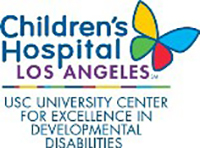 My name is Wesley Witherspoon and I am the Consumer Advocate for the USC UCEDD in Los Angeles, CA. I work with primarily with adults who receive services from the California regional centers; the two areas of civil rights that I will focus on are Voting and Self- Advocacy.
My name is Wesley Witherspoon and I am the Consumer Advocate for the USC UCEDD in Los Angeles, CA. I work with primarily with adults who receive services from the California regional centers; the two areas of civil rights that I will focus on are Voting and Self- Advocacy.
I participated in Community Voter Outreach Committee that works with the Registrar-Recorder of Voters in Los Angeles County. In addition, I am on the Voter Accessibility Advisory Committee that promotes accessibility in Los Angeles County. Our organization promotes voter registration. The director of an agency where I give trainings once told me, "There is not anyone else doing the work that you are doing." At some of the agencies where I present, the participants look forward to seeing me because they get to talk about their rights. Self-Advocacy and Voting are important to people who receive services from the regional center. We do trainings in three California Counties: Los Angeles, Ventura, and San Bernardino. We want people with disabilities to know that their input and voices are important, and that they have the same rights and responsibilities as anyone else. When I discuss self-advocacy, I discuss what choices I made in my life and how they can make informed choices as well. Responsibilities are included in the discussion of self-advocacy. Unfortunately, we live in a society where ableism is alive and well. Ableism is discrimination against people with disabilities. Like racism, sexism, and homophobia, ableism can leave physical and mental scars on a person. With our trainings on self-advocacy and voting, people with disabilities are empowered to make their own choices for their lives. People with disabilities are entitled to make decisions that are not good as long as they are not breaking the law. Self-advocacy is about work, recreation activities, relationships, transportation, voting, and everyday life. Family members are curious about how their family member with a disability will turn out when they become an adult.
A brief description on my voting and self-advocacy training style:
First of all, with my voting trainings, I encourage people to register to vote. I also discuss ways to learn about candidates and issues. In addition, I discuss how to find your polling place, and if there are accommodations needed for voting. Finally, we discuss the actual voting process and turning in your ballot. With my participation in the Los Angeles County Registrar-Recorder Voting committees, CVOC and Accessibility committees, I learn about the particular issues for people with disabilities who are involved in the major steps of voting: from registration to the final tally of votes. My own Self-advocacy training is on the ‘Beginning Steps to Self-Advocacy' series, which discusses ways to self-advocate for yourself and the rights of a person with a disability.
Partners: Community Voter Outreach Committee (Registrar-Recorder of Voters, Los Angeles County); Voter Accessibility Advisory Committee (Los Angeles County)
Mitigating Exclusionary Discipline Practices and Use of Restraint
JFK Partners; Aurora, CO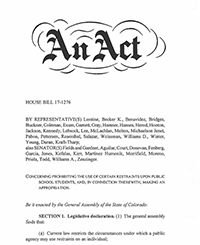 JFK Partners has been working collaboratively with partners to reduce the use of discipline practices and restraint on students with disabilities in public schools. We have worked together on efforts to develop state policies that would mitigate the use of certain practices on students in the K-12 system, as well as in early childhood settings. Our work has resulted in changes in rules regulating child care settings to proactively support children with behavioral needs and support their social emotional development. Additionally, we worked collaboratively with partners to pass legislation that bans the use of prone restraint on students in Colorado's public schools.
JFK Partners has been working collaboratively with partners to reduce the use of discipline practices and restraint on students with disabilities in public schools. We have worked together on efforts to develop state policies that would mitigate the use of certain practices on students in the K-12 system, as well as in early childhood settings. Our work has resulted in changes in rules regulating child care settings to proactively support children with behavioral needs and support their social emotional development. Additionally, we worked collaboratively with partners to pass legislation that bans the use of prone restraint on students in Colorado's public schools.
Partners: Disability Law Colorado/Colorado's Protection and Advocacy System; The Colorado Children's Campaign/Colorado's Children's Advocacy Organization; The Arc of Colorado; Colorado Chapter of the ACLU.
Building a Great Life: Closing Southbury Training School
University of Connecticut Center for Excellence in Developmental Disabilities; Farmington, CT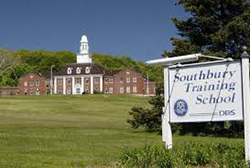 The UConn UCEDD, in collaboration with the CT Developmental Disabilities Network, launched the 2020 Campaign to close Southbury Training School, the last remaining institution in the state. This last remaining vestige of the old training school model of services housed over 200 individuals, many of whom have spent most of their lives excluded from the community, isolated from friends, family and opportunities to enjoy the simple freedom that others take for granted. Clearly a civil rights issue, the UCEDD felt compelled to conduct public education to move our Governor, legislature and state Department of Developmental Services to close this last institution in our state.
The UConn UCEDD, in collaboration with the CT Developmental Disabilities Network, launched the 2020 Campaign to close Southbury Training School, the last remaining institution in the state. This last remaining vestige of the old training school model of services housed over 200 individuals, many of whom have spent most of their lives excluded from the community, isolated from friends, family and opportunities to enjoy the simple freedom that others take for granted. Clearly a civil rights issue, the UCEDD felt compelled to conduct public education to move our Governor, legislature and state Department of Developmental Services to close this last institution in our state.
This campaign consisted of legislative education through several forums on Southbury Training School and offered data on both the residential costs and successful transitions to the community when Connecticut closed its other major institution, Mansfield Training School. Connecticut successfully closed Mansfield training school in 1993 but was unable to move the CT Department of Developmental Services, the Governor, or the CT legislature to close Southbury. The data was presented to the legislature's Intellectual and Developmental Disabilities Caucus by Jim Conroy, who had conducted extensive research on the Connecticut de-institutionalization effort, and by Allan Bergman, a national expert on closures and costs of community living. In addition, several state experts also presented information on the successful closure of Mansfield. The Campaign attracted numerous articles in the Hartford Courant about Southbury and the plight of over 2000 families whose family members are on waiting lists for community living and community-based supports. The Department of Developmental Services has no funds to assist these families but continues to fund high costs at Southbury Training School. It focused on the high costs of Southbury, now at close to $500,000 per person per year, with just under 200 residents. In addition, the Network produced a film, "Building a Great Life," about Southbury Training School that highlighted successful community transitions and the much lower associated costs. The film featured many national experts, including Andy Imparato from AUCD. This film, co-produced by CT Public Television, aired on CPTV in 2018 in conjunction with a major conference for the disability community in the state, also entitled, "Building a Great Life." Over 400 people attended the conference, which highlighted successful community living experiences and also aired the film.
Although to date Southbury Training School has not yet closed, the Commissioner of the Department of Developmental Services has publicly stated that it will close and has instructed the staff and family members of residents to be prepared for that occurrence. Our current efforts are to move our newly elected Governor to a public commitment to close Southbury with a date for closure. As the census at Southbury drops due to an aging population, the per person costs continue to rise. And the waiting list in our state continues to grow. The need is urgent and we will continue our efforts to build a great life for all our citizens with disabilities in Connecticut and to close this last institution in our state.
Partners: The CT Council on Developmental Disabilities Disability Rights CT Inc, The ARC CT
Supporting the Right to Parent
Georgetown University Center for Excellence in Developmental Disabilities; Washington, DC![]() The United States Constitution acknowledges the fundamental right of all people to marry and raise children. The 2006 United Nations Convention on the Rights of Persons with Disabilities guarantees respect for the rights of people with disability to decide freely on the number and spacing of their children (article 23) and calls for support in exercising these rights regarding family life. While these rights apply to parents with intellectual or developmental disabilities (IDD), parenting by persons with I/DD continues to provoke concern and attracts (typically negative) attention. Much of the concern and attention can be attributed to poor professional and provider expectations of their capacity to parent, which often results in parents losing their children to child protection and foster care systems. In many cases, negative determinations are based solely upon the parent's disability, without the benefit of assessment of parent's actual parenting skills; and does not take into consideration the possibility of successful parenting with appropriate support and parent education. The Georgetown UCEDD, through a grant from the District of Columbia's Developmental Disabilities Administration (DDA), developed the DDA Health Initiative's Project Impact- Parent Education Program to address the need for parent support and education, and protection of parental rights.
The United States Constitution acknowledges the fundamental right of all people to marry and raise children. The 2006 United Nations Convention on the Rights of Persons with Disabilities guarantees respect for the rights of people with disability to decide freely on the number and spacing of their children (article 23) and calls for support in exercising these rights regarding family life. While these rights apply to parents with intellectual or developmental disabilities (IDD), parenting by persons with I/DD continues to provoke concern and attracts (typically negative) attention. Much of the concern and attention can be attributed to poor professional and provider expectations of their capacity to parent, which often results in parents losing their children to child protection and foster care systems. In many cases, negative determinations are based solely upon the parent's disability, without the benefit of assessment of parent's actual parenting skills; and does not take into consideration the possibility of successful parenting with appropriate support and parent education. The Georgetown UCEDD, through a grant from the District of Columbia's Developmental Disabilities Administration (DDA), developed the DDA Health Initiative's Project Impact- Parent Education Program to address the need for parent support and education, and protection of parental rights.
Project Impact's two Parent Educators/Coordinators provide in-home services to approximately 40 pregnant or parenting women and men with IDD in the District of Columbia. Parent Educators provide individualized safety and skill-based supports tailored to meet each parent's areas of strength and growth, and the age and developmental stage(s) of the children within each household. Parent Educators develop and follow parent teaching plans based upon "The Health and Wellness Program: A Parenting Curriculum for Families at Risk" (Tymchuk, A., 2006), and "Parents as Teachers Foundational Training Guide and Training Curriculum" (Parents as Teachers National Center, Inc., 2014). Parent education sessions are convened weekly for up to 90 minutes per session, and emphasize attainment of new skills, and monitoring and maintenance of current skill levels. The ultimate goal of teaching plans is to build mastery in various core skill areas such as: (1) child growth and development; (2) recognizing common child health problems & emergencies; (3) communication and engagement with child; (5) practicing good decision-making; (6) financial management; (7) home safety and accident prevention; and (8) contemporary topics in parenthood (motherhood, fatherhood, co-parenting, and multigenerational families). Parent Educators assist parents in navigating social service, child care, education, rehabilitation, child and family services, health and other systems that parents interact with and on behalf of their children.
In addition, Parent Educators provide training and support to DDA Service Coordinators and provider agency staff to ensure continuity of practices, behaviors and expectations of parents, and facilitate information exchange and the transfer of knowledge and skills.
Partners: DC Developmental Disabilities Administration, Quality Trust, Children's Legal Center, Health Services for Children with Special Needs
Civil Liberties: Does All Really Mean All?
Center for Disabilities Studies; Newark, DE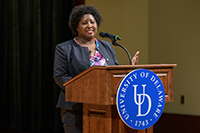 In celebration of our 25th anniversary, the Center for Disabilities Studies hosted two events that explored the role of people with disabilities in elections and how voting-related policies and practices impact that role. In the morning, a civil liberties forum titled "Underrepresented: People with Disabilities in Elections" featured a panel of national and state experts and advocates discussing how to increase accessible voting practices, engage more elected and party officials in issues of importance to people with disabilities, and get more people with disabilities to become candidates. In the afternoon, a presentation titled "Contemporary Voting Rights Controversies Through the Lens of Disability" addressed how solving problems in voting for people with disabilities will strengthen the voting process for all, especially people from disempowered communities.
In celebration of our 25th anniversary, the Center for Disabilities Studies hosted two events that explored the role of people with disabilities in elections and how voting-related policies and practices impact that role. In the morning, a civil liberties forum titled "Underrepresented: People with Disabilities in Elections" featured a panel of national and state experts and advocates discussing how to increase accessible voting practices, engage more elected and party officials in issues of importance to people with disabilities, and get more people with disabilities to become candidates. In the afternoon, a presentation titled "Contemporary Voting Rights Controversies Through the Lens of Disability" addressed how solving problems in voting for people with disabilities will strengthen the voting process for all, especially people from disempowered communities.
Featured speakers included Dr. Rabia Belt (Stanford University), Virginia Atkinson (International Foundation for Electoral Systems), Helena Berger (American Association of People with Disabilities), Michelle Bishop (National Disability Rights Network), and Delaware Attorney General Matt Den.
KNOWING Your Rights: An Advocate from Mailman Center Speaks Up!
Mailman Center for Child Development; Miami, FL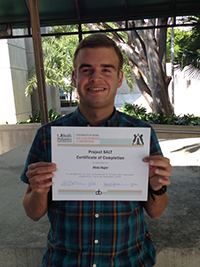 Project Self-Advocate Leadership Training (SALT) is a three-day leadership intensive. We teach a leadership skills curriculum to individuals with disabilities so that they can learn strategies to advocate for themselves, others and affect larger systems change. Our vision is to produce an ever-growing cadre of individuals with the capacity for self-determination, independence and the ability to participate in their communities in meaningful ways. Thus far, fifty young adults with disabilities have completed the Project SALT curriculum. We select cross-disability candidates over age 18. The applicants fill out an application and have an interview. We look for candidates who have some leadership experience or have the potential for growth. Our curriculum covers the following topics:
Project Self-Advocate Leadership Training (SALT) is a three-day leadership intensive. We teach a leadership skills curriculum to individuals with disabilities so that they can learn strategies to advocate for themselves, others and affect larger systems change. Our vision is to produce an ever-growing cadre of individuals with the capacity for self-determination, independence and the ability to participate in their communities in meaningful ways. Thus far, fifty young adults with disabilities have completed the Project SALT curriculum. We select cross-disability candidates over age 18. The applicants fill out an application and have an interview. We look for candidates who have some leadership experience or have the potential for growth. Our curriculum covers the following topics:
- Disability History/civil rights, Self-Advocacy, Values
- Self-Determination
- Communication
- Problem Solving
- Legislative Advocacy
- Knowing Your Rights
- Interdependence/Power Alone versus Together
Some of the outcomes we measure are; increasing their community involvement, joining self-advocacy groups, gaining knowledge about serving on boards, and the legislative process. Another topic we spend a lot of time on is knowing your rights. We teach about the laws and protections for people with disabilities, and we stress what to do if one of your rights has been violated.
Many of our alumni have learned self-determination and advocacy skills and are participating in the community in meaningful ways. One such alumni is Ricky, who was referred to Project SALT from Special Olympics. Ricky was quiet but engaged and didn't miss one class. We heard later from the Special Olympics staff that Ricky went on an interview for a new job and was selected for the position, however, he was offered a lower wage. Ricky asserted, "I know my rights. You better offer me the same as any other candidate." He got the job at Doral City Council and, three years later, is still employed there. Ricky continues to make an impact through speaking engagements for Special Olympics.
Partners: Special Olympics, SALT Advisory Board
"Money Follows the Person" (MFP) Transitions
Iowa's UCEDD; Iowa City, IA In 2007, Iowa received a federal "Money Follows the Person" (MFP) grant to assist residents of Intermediate Care Facilities for Individuals with Intellectual Disabilities (ICF/ID) to move into an integrated community setting of their choice. Since 2014, MFP has also been able to assist individuals living in nursing facilities, including those out of state, as well as adding several individuals with brain injury diagnoses to their scope of work. MFP's reach was later expanded to include helping people move from hospitals and Psychiatric Mental Institutes for Children (PMICs).
In 2007, Iowa received a federal "Money Follows the Person" (MFP) grant to assist residents of Intermediate Care Facilities for Individuals with Intellectual Disabilities (ICF/ID) to move into an integrated community setting of their choice. Since 2014, MFP has also been able to assist individuals living in nursing facilities, including those out of state, as well as adding several individuals with brain injury diagnoses to their scope of work. MFP's reach was later expanded to include helping people move from hospitals and Psychiatric Mental Institutes for Children (PMICs).
During the last year of the program, MFP Transition Specialists helped facilitate moves for 99 individuals. Over the course of the grant program, the Transition Specialists helped 750 people move from facilities to integrated community settings. These have included group living arrangements with a total of 4 or fewer people living in one location, living alone in a home or apartment, and return to parental homes.
MFP program funding ends December 31, 2019. In anticipation of that, Iowa stopped taking referrals on October 1, 2018. This was to allow sufficient time for MFP Transition Specialists to assist members with transition planning and preparation to move to the community. The Transition Specialists will provide case management during 2019 for members who have moved to community-based settings through the MFP program. MFP funding will be available through December 31, 2019, to provide the authorized supports and services to members accessing the MFP program.
Partners: Department of Human Services IME - Iowa Medicaid Enterprise UCEDD; Community Partners
The Idaho DD Network Collaborates to Improve Rights and Outcomes for People with Disabilities
Center on Disabilities and Human Development; Moscow, ID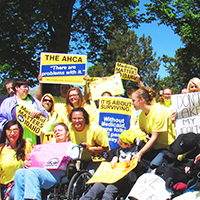 In partnership with the Idaho Developmental Disability Network, the Center on Disabilities and Human Development (CDHD) is engaged in several projects focused on improving civil and human rights of people with disabilities in the state.
In partnership with the Idaho Developmental Disability Network, the Center on Disabilities and Human Development (CDHD) is engaged in several projects focused on improving civil and human rights of people with disabilities in the state.
First, in response to a class action law suit (K.W. v. Armstrong, 1:12-cv-00022-BLW) related to budget setting methodology for adults served through the DD Waiver program, the DD network, in collaboration with the Idaho Department of Health and Welfare, formed Community NOW (CNOW), a 60-member stakeholder group led by adults with I/DD and family members. The intent of CNOW is to: (1) address and remediate the gaps in the Idaho Transition Plan, and (2) improve the quality of life and the health and safety of adults supported through HCBS. Members include adult self-advocates, families, administrators for the Idaho Department of Health and Welfare (IDHW), the Idaho Council on Developmental Disabilities (ICDD), Disability Rights Idaho (DRI), the Center on Disabilities and Human Development (CDHD), other advocacy groups, Medicaid service providers, administrators from Idaho Division of Vocational Rehabilitation (IDVR), and representatives from the Idaho Attorney General's Office (OAG) and the American Civil Liberties Union (ACLU).
Second, to extend the work of CNOW, the Center on Disabilities and Human Development in partnership with the Idaho DD network wrote for and was awarded a "Living Well" grant through the Administration on Developmental Disabilities. The goal of the Idaho Living Well Project (ILW) is to build an innovative self-advocate led, health and safety monitoring system designed to protect adults living in HCBS settings against abuse, neglect, and exploitation; and create a comprehensive career pathway to ensure that (a) providers support individuals through the use of evidence-based approaches aligned with principles of person-centered thinking and self-determination; and (b) individuals have the tools necessary to advocate, protect, and guide their own lives. The ultimate outcome is to increase the number of adults with disabilities directing their own lives, free from abuse, engaged in their communities, and satisfied with the care and supports they receive.
Third, the Idaho DD network formed a policy coalition, "Medicaid Matters in Idaho," to promote the public leadership of adults with developmental disabilities and family members working together to educate and influence policy makers. The coalition organizes community conversations with legislators on Medicaid and Disability, hosts rallies, and meetings with key representatives to share personnel impact stories.
Partners: Idaho's University Center on Disabilities and Human Development; The Idaho Council on Developmental Disabilities; Disability Rights Idaho; Self-Advocacy Leadership Network; Idaho Department of Health and Welfare; American Civil Liberties Union
Civic Engagement Program at a Charter School for Dropouts
Institute on Disability and Human Development, University of Illinois at Chicago; Chicago, IL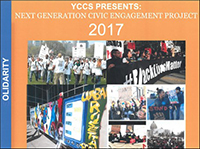 Illinois UCEDD faculty Dr. Fabricio Balcazar facilitated the implementation and conducted the evaluation of a Civic Engagement Program at a Local Charter School for Dropouts. The program is inclusive and not just for students with disabilities (high incidence). The program introduces classroom discussions and reflections about contextual factors that impact the youth lives and encourages community action and involvement through volunteer work. Groups of students choose a target topic and prepare public presentations to other students and families. Students increase their critical understanding of the issues and the importance of taking action.
Illinois UCEDD faculty Dr. Fabricio Balcazar facilitated the implementation and conducted the evaluation of a Civic Engagement Program at a Local Charter School for Dropouts. The program is inclusive and not just for students with disabilities (high incidence). The program introduces classroom discussions and reflections about contextual factors that impact the youth lives and encourages community action and involvement through volunteer work. Groups of students choose a target topic and prepare public presentations to other students and families. Students increase their critical understanding of the issues and the importance of taking action.
Partner: Youth Connection charter school
Supporting the Americans with Disabilities Act in Indiana
Indiana Institute on Disability and Community at Indiana University; Bloomington, IN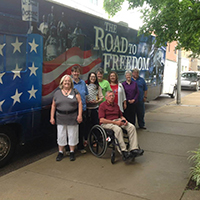 For almost 30 years, the Indiana Institute on Disability and Community at Indiana University, Bloomington has worked with the Indiana Governor's Council for People with Disabilities (DD Council) and the Great Lakes ADA Center (UIC UCEDD) to support a volunteer- based organization, ADA-Indiana. The members of ADA-Indiana include representatives from Centers for Independent Living, State Agencies, the DD Council, Protection and Advocacy, local government, universities, and disability advocates.
For almost 30 years, the Indiana Institute on Disability and Community at Indiana University, Bloomington has worked with the Indiana Governor's Council for People with Disabilities (DD Council) and the Great Lakes ADA Center (UIC UCEDD) to support a volunteer- based organization, ADA-Indiana. The members of ADA-Indiana include representatives from Centers for Independent Living, State Agencies, the DD Council, Protection and Advocacy, local government, universities, and disability advocates.
ADA-Indiana provides free information on the Americans with Disabilities Act (ADA) by participating in conferences throughout the state, including the Indiana Conference on Disability, Self-Advocates of Indiana and Arc of Indiana Conference, Fort Wayne Disability Expo, American Council of the Blind Indiana Convention, and the Indiana Association of the Deaf Biennial Conference. In addition to promoting the national ADA Help line maintained by the ADA National Network, Institute staff provides technical assistance and resources on the ADA by phone, email, and yes, even regular mail. ADA-Indiana supports training on the ADA throughout the state, either by hosting our own events, or through funding local community projects through the annual ADA grants program. Some of the audiences we have reached recently through hosted training events include municipal ADA Coordinators, building and code officials, and health care professionals.
Through the local community ADA grants program (supported by the Indiana Governor's Council for People with Disabilities), ADA-Indiana is able to support community organizations to identify an issue and address it through training and education. Some of the grants supported in the past few years include: Employment First and ADA Workshop Series; ADA Requirements for Law Enforcement and First Responders; Beach Safety for All: Focus on Law Enforcement; The ADA and Access to the Arts; ADA Assistance to Local Restaurants; and Accessible Voting Training for Local Election Officials.
As the 30th Anniversary of the ADA approaches, ADA-Indiana is planning activities to gather input from Hoosiers with disabilities on what can we celebrate about 30 years, and what is still missing. The Indiana Institute on Disability and Community's Center on Health Equity will conduct interviews with state disability leaders, host several town meetings in different parts of the state, and collect input through an online survey.
Partners: Indiana Institute on Disability and Community at Indiana University, Bloomington; Indiana Governor's Council for People with Disabilities (DD Council); and the Great Lakes ADA Center (UIC UCEDD)
Supporting Supported Decision Making
University of Kansas LEND; Kansas City, KS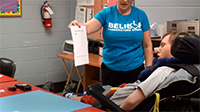 Parent faculty testified in favor of the state of Kansas' new Supported Decision Making (SDM) Bill to set up a legal framework for SDM in Kansas. This bill would make it possible for adults with I/DD to legally engage a chosen decision-making companion without losing any of their rights through having to have a guardian. Kansas exceeds the national average for percentage of people who have a guardian, so the hope is this alternative would reduce that.
Parent faculty testified in favor of the state of Kansas' new Supported Decision Making (SDM) Bill to set up a legal framework for SDM in Kansas. This bill would make it possible for adults with I/DD to legally engage a chosen decision-making companion without losing any of their rights through having to have a guardian. Kansas exceeds the national average for percentage of people who have a guardian, so the hope is this alternative would reduce that.
Efforts to Promote Self-Determination in the Transition to Integrated Employment for Adolescents with Intellectual Disability
Kansas University Center on Developmental Disabilities; Lawrence, KS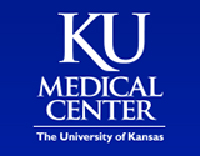 The Kansas University Center on Developmental Disabilities (KUCDD) has been engaged in a multi-year project (beginning in 2015 and ongoing) examining the implementation of interventions to promote self-determination in the context of transition planning for students with intellectual disabilities in the state of Rhode Island (RI) in partnership with the Paul V. Sherlock Center on Disabilities at Rhode Island College. This project began after the state of Rhode Island entered into a Consent Decree with the U.S. Department of Justice to address violations of Title II of the Americans with Disabilities Act as interpreted by the Supreme Court in Olmstead v. L.C. (1999) in the context of employment supports and services in 2014 to address unnecessary overreliance on segregated sheltered workshops and facility-based day programs. The Consent Decree named adolescents with intellectual disability (aged 14 and older in state law) eligible for transition services as one of the targeted populations, emphasizing the critical role of transition supports and services to enable transition to integrated, competitive employment.
The Kansas University Center on Developmental Disabilities (KUCDD) has been engaged in a multi-year project (beginning in 2015 and ongoing) examining the implementation of interventions to promote self-determination in the context of transition planning for students with intellectual disabilities in the state of Rhode Island (RI) in partnership with the Paul V. Sherlock Center on Disabilities at Rhode Island College. This project began after the state of Rhode Island entered into a Consent Decree with the U.S. Department of Justice to address violations of Title II of the Americans with Disabilities Act as interpreted by the Supreme Court in Olmstead v. L.C. (1999) in the context of employment supports and services in 2014 to address unnecessary overreliance on segregated sheltered workshops and facility-based day programs. The Consent Decree named adolescents with intellectual disability (aged 14 and older in state law) eligible for transition services as one of the targeted populations, emphasizing the critical role of transition supports and services to enable transition to integrated, competitive employment.
Self-determination, defined by acting as the causal agent in one's life, plays a critical role in the transition from high school to postsecondary education, employment, and community living for all students, including students with intellectual disability. Targeted instruction and opportunities to practice and use the skills associated with self-determination across contexts, with appropriate supports and accommodations can enhance self-determination. The Self-Determined Learning Model of Instruction (SDLMI) is a teaching model designed to enable teachers to promote self-determined action by focusing on the goal setting and attainment process. Since teachers began implementing the SDLMI in 2015-16, transition-age students with intellectual disability in Rhode Island have set over 1,300 transition-related goals, with students reaching or exceeding expected levels of goal attainment on average. Over several years of analyses, teachers and students have reported significant growth in student self-determination.
Beginning in 2016-17, half of participating teachers also began implementing "Whose Future Is It?", an evidence-based transition-planning curriculum, and subsequently all participating teachers implemented both the SDLMI and "Whose Future Is It?" in 2017-18. After one year of implementation of the SDLMI only as compared to the SDLMI and "Whose Future Is It?", students in the SDLMI only group showed greater gains overall, however the most recent analysis of the impact of a second year of SDLMI and "Whose Future Is It?" showed the reverse pattern, with greater annual gains for students in the SDLMI and "Whose Future Is It?" group over two years.
Overall, these analyses suggest the significant, positive impacts of implementing self-determination interventions, specifically the SDLMI and "Whose Future Is It?", for transition-age students with intellectual disabilities. The most recent analyses suggests the criticality of collecting data over time to inform decisions about effective self-determination interventions and the importance of taking a long-term, life course perspective on promoting self-determination.
Partners: Paul V. Sherlock Center on Disabilities at Rhode Island College; School Districts across the state of Rhode Island
Diverse by Design: Integrating Early Childhood Programs
LSUHSC Human Development Center; New Orleans, LA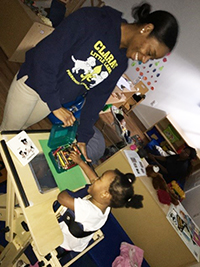 The Americans with Disabilities Act guarantees that children with disabilities cannot be excluded from public accommodations (e.g., preschools, child care centers) simply because of a disability. Families with infants and toddlers with disabilities need childcare at comparable rates as families of children without disabilities, but they face additional obstacles to equal access. Child care centers often are not equipped to meet the needs of children with disabilities and teachers lack appropriate training. Families report having few quality child care options. In addition, many children with disabilities have additional medical costs and families may struggle to pay the additional expense of childcare. Although the law prohibits child care centers from excluding children with disabilities, exclusion and expulsion rates in child care and preschool continue to rise. Families are often told a center cannot accommodate their child for a variety of reasons such as they are not toilet trained or they display challenging behavior.
The Americans with Disabilities Act guarantees that children with disabilities cannot be excluded from public accommodations (e.g., preschools, child care centers) simply because of a disability. Families with infants and toddlers with disabilities need childcare at comparable rates as families of children without disabilities, but they face additional obstacles to equal access. Child care centers often are not equipped to meet the needs of children with disabilities and teachers lack appropriate training. Families report having few quality child care options. In addition, many children with disabilities have additional medical costs and families may struggle to pay the additional expense of childcare. Although the law prohibits child care centers from excluding children with disabilities, exclusion and expulsion rates in child care and preschool continue to rise. Families are often told a center cannot accommodate their child for a variety of reasons such as they are not toilet trained or they display challenging behavior.
The Human Development Center (HDC) seeks to fulfill its mission of supporting full participation of people with disabilities by building the capacity of communities to effectively include everyone. The approach to building community capacity to serve infants and toddlers with disabilities and their families includes a multi-pronged approach which consists of working with systems to increase access to quality programs, providing technical assistance to child care providers, and providing parent education. HDC has worked with the Louisiana Early Childhood Care and Education (ECCE) Council to substantially increase the child care subsidy rate for children with disabilities and reduce the work requirement for families of children with disabilities. The hours a family can work are often reduced as a result of increased medical and therapy appointments. This made it difficult for some families to meet the work requirements. The ECCE successfully pushed to cut the work requirement in half. The increased subsidy rate paid for children with disabilities is meant to provide additional financial resources for classroom supports. HDC recognizes that giving centers additional funds is only the first step. Through an Early Head Start-Child Care Partnership grant, HDC supports 28 classrooms in centers in high need areas of New Orleans to include children with disabilities and at risk for disabilities. Each classroom uses a mixed-delivery design that includes children whose enrollment is funded through Early Head Start and/or subsidy, tuition, and includes at least one child with a disability. Teachers and families receive general training on disabilities as well as practice-based coaching to effectively working with early intervention providers and support children to learn and effectively participate.
HDC is expanding the ‘diverse by design' model of service delivery by intentionally developing policies to promote socioeconomic and racial integration in early childhood settings and inclusion of children with disabilities (e.g., increased quality, mixed funding and effective inclusion). HDC continues to work with the local community early childhood network and the Department of Education to provide technical assistance and training to replicate this model.
Partners: Louisiana Department of Education; LA Early Childhood Care and Education Council Clara's Little Lambs; Kid's Kingdom; McMillian's First Steps Toddler's University
The Institute for Community Inclusion: Holistic Transformation Away from Segregated Supports
Institute for Community Inclusion; Boston, MA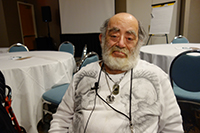 Nationally, inclusive day and employment services are emerging as a civil rights issue for people with intellectual and developmental disabilities (IDD). The U.S. Department of Justice, in settlement agreements with Rhode Island and Oregon, extended enforcement of the Americans with Disabilities Act and the Olmstead v. LC decision to mandate access to competitive integrated employment and community-based day services and supports. At the same time, the Medicaid Home and Community Based Services (HCBS) Final Rule calls for "full access of individuals receiving Medicaid HCBS to the greater community, including opportunities to seek employment and work in competitive integrated settings, engage in community life, control personal resources, and receive services in the community, to the same degree of access as individuals not receiving Medicaid HCBS" (http://bit.ly/2Sz6tWR, emphasis added).
Nationally, inclusive day and employment services are emerging as a civil rights issue for people with intellectual and developmental disabilities (IDD). The U.S. Department of Justice, in settlement agreements with Rhode Island and Oregon, extended enforcement of the Americans with Disabilities Act and the Olmstead v. LC decision to mandate access to competitive integrated employment and community-based day services and supports. At the same time, the Medicaid Home and Community Based Services (HCBS) Final Rule calls for "full access of individuals receiving Medicaid HCBS to the greater community, including opportunities to seek employment and work in competitive integrated settings, engage in community life, control personal resources, and receive services in the community, to the same degree of access as individuals not receiving Medicaid HCBS" (http://bit.ly/2Sz6tWR, emphasis added).
These federal actions emphasize inclusive settings as the keystone for people with IDD to live as integrated members of their communities, creating pressure on state IDD agencies and local service providers to transform the existing system from one that is still largely segregated to one focused on individualized, age-appropriate community-based activities, including competitive integrated employment.
The Institute for Community Inclusion (ICI) has been actively engaged in identifying and disseminating solutions that facilitate this systems transformation toward inclusion. Our ongoing research on day services and supports has led to identification of research-based Guideposts for Community Life Engagement defining four key elements of day services and supports that lead to engagement in community life for people with IDD. We have incorporated these guideposts into the Community Life Engagement Toolkit designed to support providers in transforming away from segregated day services and supports.
Simultaneously, ICI has been conducting research on the process of provider transformation away from sheltered workshops toward competitive integrated employment. Through this project ten research-based elements necessary for successful transformation were identified. These ten elements are reflected in ICI's Agency Change Toolkit, designed to support providers in transforming away from segregated work settings (see a summary of the Agency Change Toolkit).
Both efforts have uncovered the need for holistic provider transformation to include both employment and other day services and supports. This holistic transformation model can support a fully included life vision, including both employment and other forms of community life engagement for each individual with IDD. The model has been translated into technical assistance to over 30 service providers across the country, which includes an in-person site visit, customized assessments of strengths and areas for improvement, development of concrete action plans, monthly phone follow up, monthly topical and virtual discussions to encourage peer support and innovations exchange, and a collection of tools to evaluate progress over time. Through this effort, the ICI is partnering with service providers to realize the vision of full community inclusion as a civil right for every individual with IDD.
Partners: National Association of State Directors of Developmental Disabilities Services; (NASDDDS) The Arc of the United States
LEND Fellows Educating Legislators About Civil Rights
LEND Boston/Institute for Community Inclusion; Boston, MA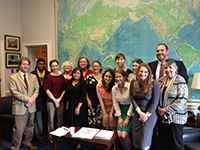 The LEND program at the ICI/UCEDD at Boston Children's Hospital has since 2005 been sending all its long-term LEND leadership fellows to the Disability Policy Seminar and to Capitol Hill to speak with and to educate legislators regarding pending legislation and its impact of people with disabilities and their families. These efforts have resulted in 15 years of directly working towards federal civil rights legislation. Over 300 LEND fellows have participated in this program trying to increase the civil rights of people with developmental and related disabilities.
The LEND program at the ICI/UCEDD at Boston Children's Hospital has since 2005 been sending all its long-term LEND leadership fellows to the Disability Policy Seminar and to Capitol Hill to speak with and to educate legislators regarding pending legislation and its impact of people with disabilities and their families. These efforts have resulted in 15 years of directly working towards federal civil rights legislation. Over 300 LEND fellows have participated in this program trying to increase the civil rights of people with developmental and related disabilities.
One of the great successes of this program and one that taught that perseverance is critical in the fight for civil rights were highlighted in our efforts to educate legislators about the ABLE Act. For years we worked hard to educate our delegation of US Representatives and Senators and their staff about the fairness and benefits proposed in the act. The ABLE Act was finally passed in December of 2014 after 4 plus years of moving toward these goals. We advanced from approximately 10-15 co-sponsors of the bill to over 400 when the bill was eventually passed.
This lesson on persistence, patience, and pointing out public-minded advantages to the bill showcased the way civil rights are typically gained - through hard work. Our LEND fellows have continued to fight for, and privately advocate for, enhanced civil rights for people with developmental and related disabilities and their families. This year efforts may focus on the Autism CARES Act, among others, to continue to advance civil rights for all Americans.
Partners: AUCD, AAIDD, SABE, UCP, NACDD, The Arc
Protecting the Promise of a Free Appropriate Public Education
Maryland Center for Developmental Disabilities; Baltimore, MD
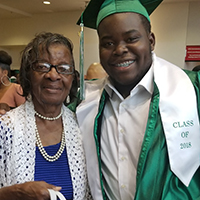 Project HEAL (Health, Education, Advocacy, and Law) is a community-based program of the Maryland Center for Developmental Disabilities at the Kennedy Krieger Institute. Project HEAL is Maryland's only medical-legal partnership, and the only medical-legal partnership in the country affiliated with a University Center for Excellence in Developmental Disabilities Education, Research, and Service. Project HEAL attorneys represent children with disabilities who are at risk for adverse outcomes within the school setting, and violations of their civil rights, if they are not provided with necessary services and supports. Project HEAL attorneys work to ensure that children with disabilities have the educational program and placement that they are entitled to under the law. Since 2005, Project HEAL attorneys have represented over 640 children with disabilities from low-and moderate-income families, who are receiving special education and related services in their local school systems. Attorneys have also provided limited representation (e.g., brief advice, document review, referrals, and resources) to over 3,000 families. In addition to direct legal services, attorneys consult with Kennedy Krieger faculty, staff, and trainees, and present on civil rights related topics at the local, state, and national level.
Project HEAL (Health, Education, Advocacy, and Law) is a community-based program of the Maryland Center for Developmental Disabilities at the Kennedy Krieger Institute. Project HEAL is Maryland's only medical-legal partnership, and the only medical-legal partnership in the country affiliated with a University Center for Excellence in Developmental Disabilities Education, Research, and Service. Project HEAL attorneys represent children with disabilities who are at risk for adverse outcomes within the school setting, and violations of their civil rights, if they are not provided with necessary services and supports. Project HEAL attorneys work to ensure that children with disabilities have the educational program and placement that they are entitled to under the law. Since 2005, Project HEAL attorneys have represented over 640 children with disabilities from low-and moderate-income families, who are receiving special education and related services in their local school systems. Attorneys have also provided limited representation (e.g., brief advice, document review, referrals, and resources) to over 3,000 families. In addition to direct legal services, attorneys consult with Kennedy Krieger faculty, staff, and trainees, and present on civil rights related topics at the local, state, and national level.
Project HEAL is committed to protecting the rights of, and improving special education services for, children with disabilities in Maryland. A recent case example exemplifies this commitment. Malcolm (whose name has been changed) is an 18-year-old, African-American adolescent diagnosed with attention deficit hyperactivity disorder, encephalopathy, and a specific learning disability with impairment in reading. Malcolm began receiving special education and related services through an individualized education program (IEP) as a child. However, he made no measurable progress. His goals and objectives on his IEP remained stagnant and his service hours were often reduced without any evidence of progress. Additionally, despite assessments indicating that Malcolm had not mastered basic reading skills, the school system failed to address his difficulties. Malcolm's dream was to work for the local police department upon graduating from high school; however, because his reading skills were at a fourth-grade level, he likely could not pass the required written civil service test. Effectively, Malcolm was prevented from pursuing his dream due to a lack of appropriate instruction in school. Malcolm retained Project HEAL just two months prior to graduation. A Project HEAL attorney attended an IEP meeting and advocated for Malcolm, but ultimately determined that a due process hearing would be the most effective and efficient way to protect Malcolm's rights and obtain the services he desperately needed. Project HEAL filed a complaint and negotiated a settlement with the local school system to obtain compensatory services for Malcolm. As a result, Malcolm was able to attend a local community college, at the school system's expense, where he is making great strides. He was also provided with over 300 hours of direct, one-on-one, private tutoring to help him improve his reading abilities. Thanks to Project HEAL's advocacy, Malcolm hopes to take and pass the civil service test to pursue his dream of becoming a police officer.
Partners: The Department of Neuropsychology at Kennedy Krieger Institute; the Center for Development and Learning at Kennedy Krieger Institute; Sylvan Learning Center; and the Community College of Baltimore County.
Early Childhood Inclusion and Training of Health Professionals
Maine LEND Program; Portland, ME
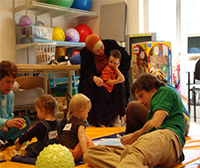 The Individuals with Disabilities Education Act (IDEA) mandates that children be educated in the least restrictive environment and the benefits of inclusive programming for children includes improved social interactions, increased academic achievement, and more meaningful engagement in life activities (Cole, Murphy, Frisby, Grossi, & Bolte, AUCD 2019). Although this law has been in effect for over 30 years, children with disabilities are still too often excluded from participation with their peers in both school and community settings. Research tells us that attitudes of children towards children with different abilities are formed in their earliest years, and that these attitudes are shaped by experiences. At the University of New England (UNE) we have been addressing the need for inclusive early intervention experiences through a Transdisciplinary Toddler Playgroup for the last 10 years. The Maine LEND Program trainees support and learn from this program. In this unique setting, not only do children learn to play alongside other children of all abilities, but the parents of all children learn to expect that the rights of inclusion are met. Graduate students and LEND Trainees learn these lessons too, as well as how to relate to and play with children to help make inclusion happen.
The Individuals with Disabilities Education Act (IDEA) mandates that children be educated in the least restrictive environment and the benefits of inclusive programming for children includes improved social interactions, increased academic achievement, and more meaningful engagement in life activities (Cole, Murphy, Frisby, Grossi, & Bolte, AUCD 2019). Although this law has been in effect for over 30 years, children with disabilities are still too often excluded from participation with their peers in both school and community settings. Research tells us that attitudes of children towards children with different abilities are formed in their earliest years, and that these attitudes are shaped by experiences. At the University of New England (UNE) we have been addressing the need for inclusive early intervention experiences through a Transdisciplinary Toddler Playgroup for the last 10 years. The Maine LEND Program trainees support and learn from this program. In this unique setting, not only do children learn to play alongside other children of all abilities, but the parents of all children learn to expect that the rights of inclusion are met. Graduate students and LEND Trainees learn these lessons too, as well as how to relate to and play with children to help make inclusion happen.
The Transdisciplinary Toddler Playgroup is an Interprofessional learning experience that provides experiential education for students in the UNE Westbrook College of Health Professions; service to the community; and an avenue for continued research and scholarship. Since its beginning in 2010, the "Playgroup" experience has provided an integrated play experience for approximately 75 toddlers, and approximately 360 PT, 320 OT, 55 SW and 40 Nursing students with a unique, practical clinical experience in inclusion and parent support and empowerment. Since 2016, approximately 30 LEND Trainees have also experienced the power of inclusive play for children of all abilities.
The Playgroup runs for 2 hours one afternoon per week for 8 weeks during the Spring semester and includes a 45-minute parent group facilitated by social work students. The importance of inclusive experiences such as these in the academic preparation of professionals who will be working in early intervention settings after graduation is clearly identified by researchers such as Campbell, Chiarello, Wilcox, and Milbourne (2009). The Maine LEND is working to create new inclusive Playgroups across the state of Maine, as few are currently in use in early intervention. The Maine LEND program will continue to train professionals as leaders to serve and advocate on the national and state levels for inclusion throughout the lifespan as the program helps children begin with a positive, hopeful, inclusive start in life!
In 2018, the Transdisciplinary Toddler Playgroup was featured on two major television stations in Maine:
- Channel 13 Playgroup video link: https://wgme.com/news/local/une-students-making-a-difference-for-toddlers-parents Channel 6
- Playgroup video link: https://www.newscentermaine.com/article/news/local/207/toddler-playgroup-educates-une-students/97-433778314
Community Integration for All: Monitoring Michigan Community Living for Individuals with I/DD
Michigan Developmental Disabilities Institute; Detroit, MI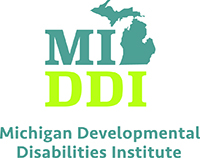 The Michigan Developmental Disabilities Institute Monitoring Project was a collaboration between the Michigan Developmental Disabilities Institute (MI-DDI) at Wayne State University and the Michigan Department of Health and Human Services, Behavioral Health and Developmental Disabilities Administration (MDHHS/BHDDA). MDHHS/BHDDA is Michigan's state agency serving individuals with Intellectual and Developmental Disabilities (I/DD). This initiative supports Michigan's effort to deliver on the United States Supreme Court decision, Olmstead vs. L.C.
The Michigan Developmental Disabilities Institute Monitoring Project was a collaboration between the Michigan Developmental Disabilities Institute (MI-DDI) at Wayne State University and the Michigan Department of Health and Human Services, Behavioral Health and Developmental Disabilities Administration (MDHHS/BHDDA). MDHHS/BHDDA is Michigan's state agency serving individuals with Intellectual and Developmental Disabilities (I/DD). This initiative supports Michigan's effort to deliver on the United States Supreme Court decision, Olmstead vs. L.C.
"On June 22, 1999, the United States Supreme Court held in Olmstead v. L.C. that unjustified segregation of persons with disabilities constitutes discrimination in violation of title II of the Americans with Disabilities Act. The Court held that public entities must provide community-based services to persons with disabilities when (1) such services are appropriate; (2) the affected persons do not oppose community-based treatment; and (3) community-based services can be reasonably accommodated, taking into account the resources available to the public entity and the needs of others who are receiving disability services from the entity."
The MI-DDI Monitoring Project began in 2008 when MDHHS/BHDDA was closing Mount Pleasant Center, Michigan's last Intermediate Care Facility for Individuals with an Intellectual Disability (ICF/IID). MDHHS/BHDDA contracted with MI-DDI to monitor the transition of individuals with intellectual and developmental disabilities from Mount Pleasant Center to community living arrangements. MI-DDI assessed the quality of services and supports of the community transition and provide technical assistance to the individual, family, and the providers supporting the individual in community living. MI-DDI monitored transitions for approximately 120 individuals with I/DD over the two-year closure process of Mount Pleasant Center. Mount Pleasant Center officially closed in September 2009. However, 20 individuals were temporarily transitioned to Caro Center, which was temporarily certified as an ICF/IDD until MDHHS/BHDDA could confirm appropriate community living arrangements were available for these 20 individuals. All project participants were living in the community by the end of September 2010.
Following the closure of Mount Pleasant Center, MDHHS/BHDDA continued its collaboration with MI-DDI. MI-DDI provided for ongoing support and observation of the community living transitions for individuals who formerly resided at Mount Pleasant Center. The collaboration continued from 2010-2018. During this phase of the project, MDHHS/BHDDA expanded the project's reach to include individuals MDHHS/BHDDA determined to be "at-risk" or vulnerable to adverse incidents. MDHHS/BHDDA decided to include individuals with I/DD who have experienced a psychiatric hospital admission, incidents that involve physical intervention because of their challenging behaviors, and/or have a complex medical condition in the MI-DDI Monitoring Project. Again, MI-DDI assessed the quality of services and supports and provided technical assistance to the individual, family, and the providers supporting the individual to community living. MI-DDI reported its findings to MDHHS/BHDDA.
In addition to the monitoring activities, the MI-DDI Monitoring Project assisted MDHHS/BHDDA to comply with the Centers for Medicare & Medicaid Services, Home Community-Based Services rule. MI-DDI assisted MDHHS/BHDDA to ensure compliance for Michigan's Habilitation Supports Waiver, this waiver supports the community living for adults with I/DD.
Partners: Michigan Department of Health and Human Services (Michigan's state agency serving individuals with I/DD, mental health disabilities, and substance use disorders)
My Time to Work . . . The ToTAL Program
Institute for Disability Studies; Hattiesburg, MS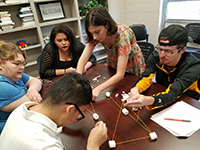 The Institute for Disability Studies (IDS) partnered with the Mississippi Department of Rehabilitation Services to offer Pre-Employment Transition Services. IDS established the Transition of Teens to Adult Life (ToTAL) work-based training and internship program for youth and young adults ages 14 to 21 that is assisting young people with disabilities in developing a path for their transition to adulthood.
The Institute for Disability Studies (IDS) partnered with the Mississippi Department of Rehabilitation Services to offer Pre-Employment Transition Services. IDS established the Transition of Teens to Adult Life (ToTAL) work-based training and internship program for youth and young adults ages 14 to 21 that is assisting young people with disabilities in developing a path for their transition to adulthood.
Various weekly training, webinars and interactive workshops are being provided at the university or in the school classroom to hundreds of students. Highlight activities include the annual ToTAL Summer Academy Program and the upcoming 2019 Alternative Spring Break. The 2018 Summer Academy was a two-week training event for 30 young adults who also participated in paid internship opportunities in the community. Plans are already underway for the second training academy for summer 2019. The ToTAL Alternative Spring Break, scheduled for March 11-15, will serve 20 young adults and will be held at The University of Southern Mississippi. "The ToTAL Alternative Spring Break will provide high school students with disabilities the opportunity to gain work skills for future employment," said Dr. Jerry R. Alliston, associate director at the Institute for Disability Studies (IDS). "The primary focus of the event is on assisting these future leaders in finding their voice, being involved in their communities and getting ready for work." To be held in Hattiesburg at Southern Miss, the week-long training session will focus on activities such as goal setting, work readiness, college exploration and developing an electronic portfolio. "A lot of high school students with disabilities may think, ‘I have a disability, so what's next for me?'" said Danielle Parks, LMSW, Transition Specialist for ToTAL. "The main goal we want to achieve through Alternative Spring Break is for these young adults with disabilities to leave with the belief that they do have the possibility of achieving their dream of employment after high school. We want them to leave with skills that will help them on their path to employment. Attendees will be participating in activities such as introducing themselves, mock interviewing, developing a resume, going on job shadow experiences, learning healthy lifestyle habits, exploring college options, and developing videos to share their personal stories. By the end of the week, each student will leave with their own profssional portfolio." The ToTAL Program concentrates on five key planning areas for young adults transitioning to adulthood: job exploration counseling, workforce readiness training, work-based learning experiences, self-advocacy training and post-secondary education counseling and training.
Partners: STEP UP to Leadership Council TRIAD Service AmeriCorps Program; Mississippi Department of Rehabilitation Services; Several Mississippi High Schools
UCEDDs Help Raise Local Voices to Inform National Policy
Rural Institute for Inclusive Communities at the University of Montana; Missoula, MT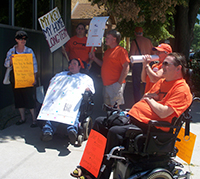 University Centers for Excellence in Developmental Disabilities Education (UCEDDs) help raise local voices to inform national policy initiatives while AUCD forges the efforts of UCEDDs and other partners into collective impacts that support people with disabilities to live self-determined lives. This is how Montana's UCEDD and its Centers for Disease Control and Prevention (CDC)-funded Disability and Health program helped raise local voices during the health care reform debates of 2009. Supported advocacy by state disability leaders helped influence Senator Max Baucus of Montana, who was the chair of the Finance Committee and played a significant leadership role in the design of the ACA and the Health Care Reform Act.
University Centers for Excellence in Developmental Disabilities Education (UCEDDs) help raise local voices to inform national policy initiatives while AUCD forges the efforts of UCEDDs and other partners into collective impacts that support people with disabilities to live self-determined lives. This is how Montana's UCEDD and its Centers for Disease Control and Prevention (CDC)-funded Disability and Health program helped raise local voices during the health care reform debates of 2009. Supported advocacy by state disability leaders helped influence Senator Max Baucus of Montana, who was the chair of the Finance Committee and played a significant leadership role in the design of the ACA and the Health Care Reform Act.
In 2002, the Montana Department of Public Health and Human Services and the University of Montana UCEDD, the Rural Institute for Inclusive Communities, secured funding from the CDC to establish the Montana Disability and Health Program (MTDH), developed as part of Montana's Olmstead planning. MTDH collaborates with a wide range of community partners and people with disabilities, service providers, and experts to develop and implement programs and services designed to promote and maximize health, prevent chronic disease, improve emergency preparedness, and increase the quality of life among people with disabilities in the state of Montana.
One of MTDH's key activities is the Disability Advisor program, which trains and supports people with disabilities to infuse disability health and wellness goals into the plans, policies, programs, and procedures of state agencies and community service providers. In 2009, the MTDH Disability Advisors helped increase awareness of the Community Choice Act as a policy intervention that could strengthen personal assistance services in Montana, a critical health support for many individuals with disabilities. MTDH and its partners organized a one-day Health Care Reform Policy Summit that brought disability stakeholders together from across the state to discuss Long-term Care and Health Care reform. What followed was a statewide effort, driven by MTDH Disability Advisors and Centers for Independent Living, to advocate for the civil rights and social justice for people with disabilities and their families. The coordinated advocacy activities that followed the summit led to a historic meeting of Montana disability leaders with Senator Baucus (D- MT), chairman of the Senate Committee on Finance. Sen. Baucus played a significant leadership role in the design of the Patient Protection and Affordable Care Act (PPACA), which included the Community First Choice Option in the proposed legislation. On March 23, 2010, former President Barack Obama signed the PPACA into law.
Despite changes to the ACA since this legislation, the 2009 Policy Summit was a significant event that demonstrated how a UCEDD network can build rural stakeholder capacity to raise voices and influence and inform national policy to impact the lives of people with disabilities. More information and photos can be found here: http://www.summitilc.org/newsletters/October2009.pdf
Partners: MT DPHHS; Montana Disability and Health Program; MT CIL Network; Joe Caldwell, Association of University Centers on Disabilities Health Disparities and Promoting Wellness for Individuals with Disabilities; Jason Beloungy, National Council on Independent Living; Lex Frieden;,University of Texas at Houston; Independent Living Research Utilization (ILRU); Claudia Clifford, Montana AARP, Helena, MT; Tom Earle, ADAPT; Miles Community College, Miles City, MT; Montana State University, Billings, MT; Northern Cheyenne Service Unit, Lamedeer, MT; Sidney Health Center, Sydney, MT
Promoting Civil Rights through Education & Empowerment
The Boggs Center on Developmental Disabilities, Rutgers Robert Wood Johnson Medical School; New Brunswick, NJ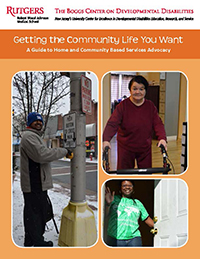 The Boggs Center on Developmental Disabilities, Rutgers Robert Wood Johnson Medical School contributes to the advancement of civil rights and social justice for people with disabilities and their families through a variety of community education and dissemination activities. Supporting the rights of people with disabilities to participate in elections has been a long-standing priority for the Center.
The Boggs Center on Developmental Disabilities, Rutgers Robert Wood Johnson Medical School contributes to the advancement of civil rights and social justice for people with disabilities and their families through a variety of community education and dissemination activities. Supporting the rights of people with disabilities to participate in elections has been a long-standing priority for the Center.
"Voting: It's Your Right" was developed in collaboration with Disability Rights NJ and the NJ Council on Developmental Disabilities. This publication continues to be distributed widely to educate people with disabilities and those that support them about legal and practical issues related to voting. Materials have also been developed to educate people with disabilities, families, and professionals on the Home and Community Based Services (HCBS) Settings Final Rule and their rights therein. "Getting the Life You Want: A Guide to Home and Community Based Services Advocacy" was designed for New Jersey service recipients as a tool to submit feedback into the state's transition plan and provide ongoing input about the HCBS services they receive. "Your Right to a Community Life: A Guide to Home and Community Based Services Advocacy" and "Supporting the Right to a Community Life: Assisting People with Developmental Disabilities to Advocate" were developed in collaboration with The Council on Quality and Leadership (CQL). These publications were created educate stakeholders across the United States about the HCBS Settings Rule, provide a tool for people with disabilities to share their experience with services, and prepare direct support professionals and families to assist service recipients to advocate for the supports they need to be included in their communities.
The Boggs Center has played an important role in introducing Supported Decision Making as an alternative to Guardianship to New Jersey's disability community. Three Developmental Disabilities Lecture Series sessions presented by international experts have been dedicated to this topic. Additionally, through collaboration with the NJCDD, the Boggs Center coordinates New Jersey's Partners in Policymaking program. Supported Decision Making is one topic covered in this 8-month intensive leadership development program for adults with disabilities and families. The program also educates participants on rights and policies as related to disability rights, inclusive education, transition to adulthood, employment, and community living.
In partnership with the New Jersey Department of Education Office of Special Education, the Boggs Center conducts NJ PBSIS providing a multi-year comprehensive professional development approach to capacity building, during which school personnel learn to design learning environments that are positive, proactive and responsive to the array of student needs present in New Jersey schools. This initiative, which targets some of NJs most challenged schools, is to build capacity among school personnel to implement a multi- tiered system of support for behavior, conduct, and social-emotional wellness that promotes equity and the right to education for all students. Student level outcomes suggest reductions in office conduct referrals and out of school suspension across all grade levels for all students combined and specifically for students with IEPs when practices are implemented with fidelity.
Partners: Disability Rights New Jersey (DRNJ); NJ Council on Developmental Disabilities (NJCDD); The Council on Quality and Leadership (CQL); NJ Department of Education, Office of Special Education
ROC EmployABILITY Summit
Strong Center for Developmental Disabilities; Rochester, NY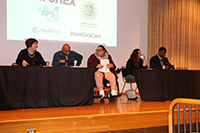 On October 4th, 2018 the Strong Center for Developmental Disabilities (SCDD), the University Center for Developmental Disabilities in Rochester, NY, and Starbridge, a disability service provider agency, collaborated to create an opportunity for employment experts and community stakeholders to come together and brainstorm barriers and strategies for decreasing poverty and increasing employment for people with disabilities in Rochester. This event, known as The ROC EmployABILITY Summit, was born of a recognition that people with disabilities in the City of Rochester are the poorest of any city in the country. The primary reasons for this startling statistic are poor educational outcomes, underemployment in the lowest paying jobs, and unemployment.
On October 4th, 2018 the Strong Center for Developmental Disabilities (SCDD), the University Center for Developmental Disabilities in Rochester, NY, and Starbridge, a disability service provider agency, collaborated to create an opportunity for employment experts and community stakeholders to come together and brainstorm barriers and strategies for decreasing poverty and increasing employment for people with disabilities in Rochester. This event, known as The ROC EmployABILITY Summit, was born of a recognition that people with disabilities in the City of Rochester are the poorest of any city in the country. The primary reasons for this startling statistic are poor educational outcomes, underemployment in the lowest paying jobs, and unemployment.
Retired Senator Tom Harkin, an author and Senate sponsor of the Americans with Disabilities Act (ADA), was the keynote speaker and led the day by noting that employment is the area in which the ADA has been the least successful. The ADA is a civil rights law that prohibits discrimination based on disability, and it is clear discrimination in employment remains a pervasive problem in the City of Rochester. He challenged our community to identify strategies and recommendations for a path forward.
The Summit also included a combination of speakers and panels that featured subject matter experts, self-advocates and government officials. Additionally, six breakout sessions were held that focused on known barriers and were designed to serve as a diverse working group to help develop a set of recommendations for a path forward. Key recommendations included: development of a funded taskforce and/or coalition to continue the work of the Summit; strengthening and aligning formal partnerships with key stakeholders, including businesses, schools, adult systems, families, and people with disabilities; a focused effort on for-profit businesses and not-for-profit agencies in learning to understand the benefits and return on investment of hiring people with disabilities; helping businesses identify their need for diverse employees rather than relying on placing people with disabilities in available jobs; and job coaches and job developers being better attuned to the skills required for each job and learning how to develop natural support within the job setting.
It was clear from the Summit that if Rochester is to address the issue of the poverty of people with disabilities, a community commitment must be made by businesses, government, agencies, and educational institutions. Summit feedback indicated this collaborative event was a key first step in making meaningful change.
Partners: Starbridge, Retired Senator Tom Harkin, Andy Imparato, Susan Hetherington, Jeiri Flores, John Robinson
Growing a Medical Legal Collaboration
Rose F. Kennedy University Center of Excellence in Developmental Disabilities; Bronx, NY The Rose F. Kennedy UCEDD's new 2017 grant incorporates a goal of working towards a medical legal partnership which would produce a cadre of disability-informed attorneys as well as offer services to families. To accomplish this, the UCEDD formed a collaboration with the Fordham University School of Law and Bronx Defenders (a holistic defense legal aid). Thus far, activities have included:
The Rose F. Kennedy UCEDD's new 2017 grant incorporates a goal of working towards a medical legal partnership which would produce a cadre of disability-informed attorneys as well as offer services to families. To accomplish this, the UCEDD formed a collaboration with the Fordham University School of Law and Bronx Defenders (a holistic defense legal aid). Thus far, activities have included:
- Presentations by UCEDD faculty about special education evaluations at the Fordham Law School's Family Advocacy seminar (which focuses on special education rights)
- Family Advocacy students held a legal clinic for UCEDD families regarding special education
- Bronx Defenders presented a 'how-to' on supporting families through child welfare investigations
- Family Advocacy students observed our multi-disciplinary clinical case conference to inform their protection of the rights of students with disabilities
A manuscript describing this collaboration is under review.
Partners: Fordham University School of Law (Leah Hill, Esq.); Bronx Defenders (Caitlin Becker, MSW and Emma Ketteringham, Esq.)
WIHD's Community Support Network Advancing Civil Rights for Persons WIth I/DD in New York
Westchester Institute for Human Development (WIHD); Valhalla, NY![]() The Community Support Network (CSN) at WIHD is driven by the vision of the UCEDD network and civil rights for individuals in everything we do. All of our efforts are considered, planned, and implemented through a lens of inclusion and equity. Here is a sampling of some recent exciting efforts of our Community Support Network.
The Community Support Network (CSN) at WIHD is driven by the vision of the UCEDD network and civil rights for individuals in everything we do. All of our efforts are considered, planned, and implemented through a lens of inclusion and equity. Here is a sampling of some recent exciting efforts of our Community Support Network.
WIHD has several new initiatives around Housing which are focused on ensuring access to integrated community settings for individuals and addressing concerns about equity and opportunity in housing. In the spring of 2018, WIHD initiated Transition Connections, a group for families of young adults with I/DD, developed in response to consistent outreach of concern from parents. The group is coordinated on Facebook where dynamic discussions and information sharing among experts and family members take place. We hosted three information sessions with close to 100 attendees at each. Each session educated and explored facts around different types of residential opportunities for people with I/DD. These included NY State's developmental disability agency, the Office for People with Developmental Disabilities (OPWDD), certified options; options available through Money Follows the Person funding; as well low-income housing. The sessions included legislators and experts with goals to educate, discriminate facts versus misunderstanding, identify issues, coordinate and develop new opportunities to overcome barriers, and ultimately advocate change. Many findings came out of the sessions that have since been analyzed and clarified with experts with resulting ideas for solutions. This information is being used by families in the Transitions Connections group for advocacy with state legislators; several from the group traveled to Albany to meet with their representatives in February. The work has been very impactful for engaging our legislators in informed productive conversations around needed change.
Another exciting civil rights effort is our new work around Supported Decision making (SDM). This is an area of passion here at WIHD, and CSN staff have been engaged in a funded effort in New York state to promote SDM as an alternative to guardianship. For several years, WIHD has offered guardianship support to families through family support funding from OPWDD. As an organization dedicated to the civil rights of the individuals we support, we believe that change is overdue, and have been exploring opportunities to transform this program to one that promotes and maintains the rights of the individual to be self-driven. We are excited to begin an initiative that will incorporate SDM into Self-direction (Money Follows the Person) Services. WIHD is planning to serve as a pilot site for a project to build SDM into the support process (with funding) for Self-Direction. Self-Direction staff here at WIHD will be participating in intensive training to become SDM facilitators and will gradually transform our guardianship program into a service that aligns with the times and the rights of the people we strive to support. We are excited about the opportunity to provide leadership in New York state to promote this imperative.
Partners: NYS Office of People with Developmental; Disabilities Disability Rights New York; NYS Developmental Disabilities Planning Council TAFT Foundation
Next Chapter Book Clubs
Nisonger Center at Ohio State University; Columbus, OH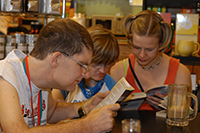 In 2001 Dr. Tom Fish and a group of LEND trainees and faculty launched the first Next Chapter Book Club (NCBC). The idea of the book club is simple: gather a group of people with intellectual and developmental disabilities who love books in a community setting to read and talk about books. Key to the NCBC model is welcoming readers of all abilities.
In 2001 Dr. Tom Fish and a group of LEND trainees and faculty launched the first Next Chapter Book Club (NCBC). The idea of the book club is simple: gather a group of people with intellectual and developmental disabilities who love books in a community setting to read and talk about books. Key to the NCBC model is welcoming readers of all abilities.
How is this civil rights issue? NCBC has broadened the definition of literacy and allowed people with IDD (many of whom were denied access to learning to read and write as children) to participate in literacy activities as lifelong learners. NCBC considers literacy as more than reading and writing independently - it's meeting with friends, reading (with and without supports) and discussing ideas from books. NCBC supports all learners and promotes social participation and community participation and inclusion. In addition to welcoming all participants as readers NCBC (which often meet in local book stores and coffee shops) helps encourage community inclusion and friendships.
The NCBC creates one small change toward the celebration of human diversity and inclusion.
Partners: Nisonger Center, UCEDD; Ohio Developmental Disability Council Columbus Foundation; Fish Family Foundation
Protecting the Civil Rights of Parents with Disabilities
University of Cincinnati Center for Excellence in Developmental Disabilities; Cincinnati, OH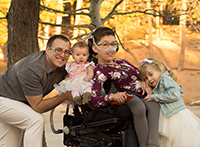 The United States of America recognizes the rights of parents to raise their children as they see fit as one of the fundamental liberties protected by the Fourteenth Amendment. The Court further specifies that it is in the best interest of children to be raised by their natural parents. Thus, parents should have fundamental rights to keep their families intact. Despite these protections, parents with disabilities are the only distinct community of Americans that continue to fight for the basic right to retain custody of their children.
The United States of America recognizes the rights of parents to raise their children as they see fit as one of the fundamental liberties protected by the Fourteenth Amendment. The Court further specifies that it is in the best interest of children to be raised by their natural parents. Thus, parents should have fundamental rights to keep their families intact. Despite these protections, parents with disabilities are the only distinct community of Americans that continue to fight for the basic right to retain custody of their children.
The excessive interference and disproportionate removal rates initiated by Child Protective Services not only results in harm to children and families, but it prohibits the transmission of culture between disabled parent and their children-whether they also have disabilities or not. Removal rates where parents have psychiatric disabilities are as high as 70-80%. Parents with intellectual disabilities face removal rates between 40-80%. Despite the prohibition of "predictive neglect" by the Americans with Disabilities Act of 1990, many of these removals are based on hypothetical predictions of abuse or neglect.
The University of Cincinnati Center for Excellence in Developmental Disabilities (UCCEDD) recognizes the unjust experiences of families led by parents with disabilities. UCCEDD provides community trainings, conducts research, shares information, and actively engages in advocacy aimed to support families who experience disability. UCCEDD makes a concerted and intentional effort to recognize the inclusion of parents with disabilities within this larger group served. UCCEDD Associate Director Kara Ayers is a co-founder of the Disabled Parenting Project (DPP), which has connected over 3,500 parents to an online information clearinghouse and peer-to-peer support. DPP has also conducted 70 qualitative interviews. Among numerous goals of the study is an exploration of unique strengths and competencies within these families. UCCEDD Director, Ilka Riddle, and Ayers are in their second year of co-leading a research team of LEND trainees focused on improving outcomes for parents with disabilities and their children. Last year's work focused on educating OB/GYN providers and women with disabilities who were considering parenthood or pregnant. This year's efforts focus on supporting case managers to assist parents with disabilities in the community. UCCEDD also works in collaboration with policy makers to determine what new or updated laws might better protect these at-risk families.
The challenges faced by parents with disabilities are represented in almost every sector of our more general UCEDD work. From supporting parents to prepare for their child's IEP meeting to addressing the need for more accessible and affordable housing, the struggle for basic rights faced by parents with disabilities is magnified compared to the already daunting challenges of parenthood. While there is a great deal of work to be done to move the needle of justice towards equality, the rewards of playing an instrumental role in keeping families intact are great. We hope more UCEDDs and other collaborating partners will join our fight for the civil rights of parents with disabilities and their families.
Partners: Disabled Parenting Project; Cincinnati LEND; Hamilton County Developmental Disabilities Services
Embracing the Right to Vote
UCEDD at Oregon Health & Science University; Portland, OR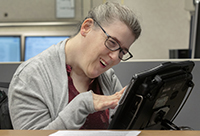 Like tens of thousands of other Oregonians, Jan Staehely carefully researched various ballot measures and candidates for office, then cast her ballot in 2014 -- or so she thought. A month following the election, she was notified that the signature on her ballot did not match the one she had used when she first registered to vote, years prior. "I wasn't surprised by the differing penmanship," said Staehely, who - for more than 50 years - doesn't recall ever having a consistent signature. "What did surprise me, however, was that because of this, my vote did not count."
Like tens of thousands of other Oregonians, Jan Staehely carefully researched various ballot measures and candidates for office, then cast her ballot in 2014 -- or so she thought. A month following the election, she was notified that the signature on her ballot did not match the one she had used when she first registered to vote, years prior. "I wasn't surprised by the differing penmanship," said Staehely, who - for more than 50 years - doesn't recall ever having a consistent signature. "What did surprise me, however, was that because of this, my vote did not count."
At birth, Staehely was diagnosed with cerebral palsy, a condition that affects speech and movement. She uses a wheelchair for mobility and assistive technologies for communication. Unfortunately, roadblocks such as these are commonplace for the more than 40 million Americans living with various disabilities. "While we don't suspect that these obstacles are intentional, the fact is they exist. And because of this, the livelihood and basic rights of many of our friends and neighbors are greatly compromised," said Rhonda Eppelsheimer, M.S.W., L.C.S.W., co-director of the OHSU University Center for Excellence in Developmental Disabilities, a center within the Institute on Development and Disability that supports the health and quality of life of Oregonians with disabilities.
To help remove these barriers, Eppelsheimer says it is necessary that more people embrace the benefits of difference. "As a society, we tend to make assumptions about people's abilities, rather than embrace the strengths that they offer. Normalizing difference will help to make such basic things as job security, health care access, and voting more universally available to all individuals, despite disability, race or socioeconomic status." While the premise may seem simple, Eppelsheimer says we, as a society, still have a long road ahead.
In the meantime, Staehely continues to embrace her individuality and is passionate about sharing her perspectives in order to better serve her community. She visits the state elections office to update her signature and ensure that her voice is heard each voting period without complaint. "Despite this extra step, and all of the planning that it requires, I don't mind. It is worth it to me," she said proudly. "However, I do look forward to a time when the burden of navigating these barriers doesn't rest on my own shoulders alone." In addition to receiving care at OHSU, Jan Staehely has worked as a communications consultant and blogger at the OHSU Institute on Development and Disability for 20 years.
**This story is reprinted from a November 2, 2018 OHSU media story by Tracy Brawley. This is an advocacy and voting awareness effort by and OHSU UCEDD staff person, Jan Staehely. The UCEDD partnered with OHSU media team to disseminate.
* Photo Caption: Jan Staehely says regularly updating her signature at the state elections office is an extra step but is worth it in order to have her vote counted. Staehely, who has cerebral palsy, was surprised to learn her ballot was rejected in a 2014 election because signature did not match the one she used to register to vote. (OHSU/Kristyna Wentz-Graff)
Next-Gen, Center on Human Development, University of Oregon
Center on Human Development; Eugene, OR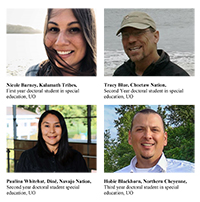 American Indian and Alaska Native (i.e., AI/AN) populations within the United States (U.S.) are faced with numerous and significant challenges. AI/AN children and youth are more likely than White children and youth to experience a host of risks including exposure to poverty, school-related difficulties (i.e., academic achievement difficulties, school suspension and expulsion, school dropout), health compromising situations (e.g., injury by a weapon and physical fights), tobacco and drug use, and premature death due to accidents and self-injurious behaviors (Barlow et al., 2012; Compton, Thomas, Stinson, & Grant, 2007; Freeman & Fox, 2005). Among school-aged children and youth ages 6-21, 14% of Indigenous students receive special education services, a proportion that is greater than any other racial group including Asian Americans (5%), Latino/a Americans (8%), African Americans (12%), and Whites (8.5%) and the risk of AI/AN students being placed into special education is approximately 1.7 times that of all other racial and ethnic groups combined (U. S. Department of Education, 2018)
American Indian and Alaska Native (i.e., AI/AN) populations within the United States (U.S.) are faced with numerous and significant challenges. AI/AN children and youth are more likely than White children and youth to experience a host of risks including exposure to poverty, school-related difficulties (i.e., academic achievement difficulties, school suspension and expulsion, school dropout), health compromising situations (e.g., injury by a weapon and physical fights), tobacco and drug use, and premature death due to accidents and self-injurious behaviors (Barlow et al., 2012; Compton, Thomas, Stinson, & Grant, 2007; Freeman & Fox, 2005). Among school-aged children and youth ages 6-21, 14% of Indigenous students receive special education services, a proportion that is greater than any other racial group including Asian Americans (5%), Latino/a Americans (8%), African Americans (12%), and Whites (8.5%) and the risk of AI/AN students being placed into special education is approximately 1.7 times that of all other racial and ethnic groups combined (U. S. Department of Education, 2018)
Consistent with other challenges, AI/AN adults have long been underrepresented in the higher education system (McClellan, Tippeconnic, Fox, & Lowe, 2005) and particularly in leadership or advanced degree areas. For example, during the past 15 years, the National Science Foundation (NSF) has tracked the number of doctoral recipients across the life sciences, physical sciences, social sciences, engineering, education, humanities, and business fields (NSF, 2014). These data indicate that in 2001 a total of 164 doctorates were awarded to people from Indigenous backgrounds across all fields combined.
Project Next-Gen originally began as an effort to recruit and train doctoral students in the University of Oregon's nationally ranked special education program to receive a PhD in special education with a focus on the needs of American Indian/Alaskan Native students with disabilities. This goal was to prepare a new generation of leaders in the field of special education who could begin to address the significant needs of AI/AN populations through research, teaching, service and outreach. To achieve this goal, we wrote a leadership training grant to OSEP which was funded in 2016. What makes this project particularly unique is that we were then able to recruit six AI/AN doctoral students into the program. Thus, not only are we developing the capacity of six doctoral students to respond to the needs of AI/NA children and youth with disabilities but the trainees themselves are American Indian (5 students) or Alaskan Native (1 student).
Partners: Office of Special Education Programs, U.S. Department of Education
Bringing Civil Rights & Social Justice to our Community
Institute on Disabilities at Temple University; Philadelphia, PA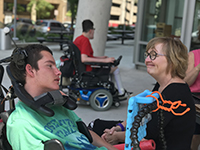 Disability Movement Timeline - As part of our effort to promote Social Justice through different media, arts and cultural events, the Institute on Disabilities at Temple University is proud to share a newly installed disability rights movement timeline. This timeline is currently on display at the Parkway Central Library in Philadelphia, PA. To view the timeline online, please visit: https://disabilities.temple.edu/voices/afkol/timeline.html
Disability Movement Timeline - As part of our effort to promote Social Justice through different media, arts and cultural events, the Institute on Disabilities at Temple University is proud to share a newly installed disability rights movement timeline. This timeline is currently on display at the Parkway Central Library in Philadelphia, PA. To view the timeline online, please visit: https://disabilities.temple.edu/voices/afkol/timeline.html
Hamburg State Center Project - The Institute on Disabilities at Temple University is researching the process of closing the Hamburg State Center. Over its nearly sixty years as an intermediate care facility and home, the Hamburg Center has played a profound role in the community and lives of thousands of individuals. The Institute aims to better understand the experiences and expectations of self-advocates, families, staff members, service providers, and communities impacted by the Hamburg Center's closure. This project includes in-depth investigation of the Hamburg Center's closure, and the transition for the entire Hamburg community, to capture the lived experiences of self-advocates and their families moving from state-operated centers into the community, as well as best practices in deinstitutionalization, person-centered planning, person and family-directed services, and the right to community inclusion.
User-Friendly Assistive Technology Programs - In 2019, the Institute launched TechOwl - "Technology for Our Whole Lives". The Institute on Disabilities at Temple University is home to many assistive technology programs and projects including Pennsylvania's Initiative on Assistive Technology (PIAT). PIAT is Pennsylvania's Assistive Technology (AT) Act Program. PIAT and the other assistive technology programs and projects create TechOWL - Technology for Our Whole Lives. The availability of these assistive technology programs promotes individuals' right to communicate, and access their community, regardless of disability, age, race, gender, location, socio-economic background or other unique characteristics. You can visit us at: https://techowlpa.org/about/
Person Directed Services and Supports (PDSS) - We continue to recognize the right to self-direct your home and community-based services as an essential option for people with intellectual disabilities and their families. In partnership with organizations including the PA Developmental Disabilities Council, Values Into Action (a support service provider), PA Health Law Project, and SAU1 (a statewide network of self-advocates), we continue to spread the word about PDSS as an option. You can learn more at: https://www.temple.edu/instituteondisabilities/programs/pds/
PDSS Partners: Values Into Action SAU1; Pennsylvania Health Law Project
Students from a Disability Segregated School to Children's Hospital of Philadelphia Employees
Children's Hospital of Philadelphia; Philadelphia, PA![]() Although the Children's Hospital of Philadelphia (CHOP) is and always has been an equal opportunity employer, it took the creation of CHOP Career Path (CCP) to enhance the workforce with people with disabilities and special health care needs oftentimes requiring reasonable accommodations. CCP, a prevocational evaluation, training and supported employment program began is 2007. Today more than 50 people work at CHOP with disabilities. Two shining examples, Charles Rawlings recently celebrated 11 years as an employee and Jarell Smith 9 years, both working full-time with all CHOP benefits. Previously, Charles and Jarell attended a segregated school for students with significant disabilities.
Although the Children's Hospital of Philadelphia (CHOP) is and always has been an equal opportunity employer, it took the creation of CHOP Career Path (CCP) to enhance the workforce with people with disabilities and special health care needs oftentimes requiring reasonable accommodations. CCP, a prevocational evaluation, training and supported employment program began is 2007. Today more than 50 people work at CHOP with disabilities. Two shining examples, Charles Rawlings recently celebrated 11 years as an employee and Jarell Smith 9 years, both working full-time with all CHOP benefits. Previously, Charles and Jarell attended a segregated school for students with significant disabilities.
Many of Charles and Jarell's classmates graduated from their segregated school and sat home, not having a plan for the next steps in their lives. Charles and Jarell wanted a different life for themselves. They wanted to work at CHOP and demonstrate their abilities. Charles is an SOS Runner. He uses his motorized wheel chair to get supplies to the in-patient floors quickly. Jarell is the creator and lead for CHOP Wheels. Costly wheelchairs were being lost. Jarell and the staff of CHOP Career Path figured out a way to keep track of the wheelchairs, keep them clean, in good repair and available whenever needed by a patient. Jarell now trains CCP interns to learn this important, money-saving job. The civil rights success is that CHOP is truly an Equal Opportunity Employer that embraces the gifts of people with disabilities enriching our workforce.
Partners: CHOP staff; Specific CHOP Departments Senior Leadership; PA Office of Vocational Rehabilitation
Leadership and Collaboration are the KEY
PR-UCEDD; San Juan, PR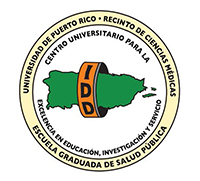 On Sept 2017, Puerto Rico was hit by a forceful Category 5 hurricane that caused unprecedented damage to the island's infrastructure. This scenario was multiplied by the lack of implementation of inclusive emergency plans that addressed the immediate needs of people with intellectual and development disabilities. While visiting the communities, the lack of support and negligence in the implementation of a plan to serve individuals with disabilities was evident. To respond to the emergency, through the leadership of the PR-UCEDD, a network of five agencies was created. The network moved to reach individuals with disabilities in order to identify their immediate needs. A collection center was created to gathered donations to distribute to those in need in order to mitigate the suffering left by Hurricane Maria. Through services and supplies more than 9,500 families where served across 68 of the 78 municipalities in the island in the response and recovery stages.
On Sept 2017, Puerto Rico was hit by a forceful Category 5 hurricane that caused unprecedented damage to the island's infrastructure. This scenario was multiplied by the lack of implementation of inclusive emergency plans that addressed the immediate needs of people with intellectual and development disabilities. While visiting the communities, the lack of support and negligence in the implementation of a plan to serve individuals with disabilities was evident. To respond to the emergency, through the leadership of the PR-UCEDD, a network of five agencies was created. The network moved to reach individuals with disabilities in order to identify their immediate needs. A collection center was created to gathered donations to distribute to those in need in order to mitigate the suffering left by Hurricane Maria. Through services and supplies more than 9,500 families where served across 68 of the 78 municipalities in the island in the response and recovery stages.
Under the leadership of the PR-UCEDD, this Network continues to work to improve the system standards of emergency preparedness for the well-being of people with disabilities in Puerto Rico. The Network aims to promote and increase the participation of communities of people with disabilities and their families in the process and response plan for emergencies and natural disasters. A toolkit has also been adapted, translated and distributed to educate communities on emergency preparedness. A total of 2,257 people have been impacted with these trainings.
THE PR UCEDD and the Network has been involved in the following emergency preparedness activities:
- advocated and reacted to local legislation that has been created in the aftermath of Maria regarding people with IDD
- advocated with the PR Housing Department and at Capitol Hill in Washington, DC for the use of CDBG-DR funds and inclusion of people with disabilities in the investment of these funds
- worked very closely with FEMA and other stakeholders throughout the response and recovery phases
- presented the accomplishments in National Conferences such as Portlight Strategies Getting It Right Conference in May 2018, the 2018 Annual Conference of the NACDD and the Virginia Emergency Management Conference in 2019
- actively participating in the development of the Core Advisory Groups
- actively participating in work groups and task forces involved in all the phases of emergency planning such as: Volunteer Organizations after Disasters (VOAD), Long Term Recovery Groups (LTRG), Strategic National Stockpile (SNS) Program, Red Cross Task Force, Portlight Inclusive Disaster Strategies Coalition, HUD Housing Plan work group, etc.
Partners: PR UCEDD (IDD); State Council on Developmental Disabilities(CEDD); Protection and Advocacy System of Puerto Rico (DPI); Puerto Rico Movement for Independent Living (MAVI); Puerto Rico Assistive Technology Program (PRATP); AUCD; and Portlight
Increasing Access to Employment and Day Activities in Integrated Community Settings
Paul V. Sherlock Center on Disabilities; Providence, RI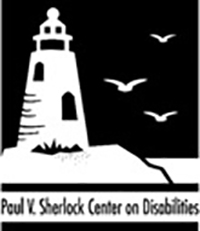 To draw attention to employment issues, the Sherlock Center (beginning in 2011) began to collect and disseminate statewide data on the number of adults with intellectual and developmental disabilities participating in integrated employment. The United States Department of Justice investigated the State of Rhode Island in 2013 and found that the state had violated Title II of the ADA in that it had not provided sufficient resources and opportunities for individuals with intellectual and developmental disabilities to pursue employment and other community day activities in integrated settings. The Sherlock Center data was extensively used in their findings. The consent agreement that was signed in 2014 specifically named the Sherlock Center to provide training and technical assistance to provider agencies to increase their capacity to transition from segregated agency-based services to person-centered supports in integrated community settings.
To draw attention to employment issues, the Sherlock Center (beginning in 2011) began to collect and disseminate statewide data on the number of adults with intellectual and developmental disabilities participating in integrated employment. The United States Department of Justice investigated the State of Rhode Island in 2013 and found that the state had violated Title II of the ADA in that it had not provided sufficient resources and opportunities for individuals with intellectual and developmental disabilities to pursue employment and other community day activities in integrated settings. The Sherlock Center data was extensively used in their findings. The consent agreement that was signed in 2014 specifically named the Sherlock Center to provide training and technical assistance to provider agencies to increase their capacity to transition from segregated agency-based services to person-centered supports in integrated community settings.
The Sherlock Center (a) provided training and technical assistance to agencies to facilitate model transformation; (b) provided several training opportunities that increased the capacity of employment specialists and facilitated approximately 300 employment specialists to become ACRE certified; (c) expanded RI's capacity to provide benefits counseling to individuals seeking employment in integrated settings; (d) developed a model for implementing person-centered thinking which focused on individuals having increased decision-making and control of their own lives; (e) did extensive outreach to individuals and families both to increase expectations for employment and to provide information and resources to facilitate individual decision-making; and (f) collected quarterly data on all adults receiving services re: employment and day activity in integrated settings.
Since the beginning of these activities there has been an increase in the percent of adolescents and adults in the populations targeted in the consent decree who are participating in employment and day activities in integrated community settings. There has been a parallel decrease in segregated facility-based work and non-work. Currently, there are no longer any sheltered workshops in Rhode Island.
Partners: State of RI Division of Developmental Disabilities; Community Provider Network of Rhode Island
Civil Rights for the Youngest of Us
University of Tennessee Boling Center for Developmental Disabilities; Memphis, TN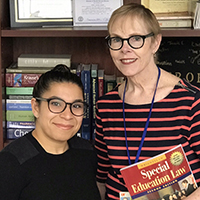 Memphis and our surrounding area has a long history of segregation. Family Faculty at the Boling Center have spoken with our legislators in Washington, DC, about the fact that there are still segregated schools here; in this case, it is segregation on the basis of disability.
Memphis and our surrounding area has a long history of segregation. Family Faculty at the Boling Center have spoken with our legislators in Washington, DC, about the fact that there are still segregated schools here; in this case, it is segregation on the basis of disability.
Several disciplines at the University of Tennessee's Boling Center for Developmental Disabilities regularly support students and families as they advocate for less restrictive options in school settings. Navigation of the special education system is a noted stressor for many families served by our center. Advice is sought through in person consultation and through IEP meeting support by our staff.
On a more systemic level, students and staff are involved with state-wide advocacy groups in an effort to address trends in disproportionate representation in special education, disproportionate disciplinary practices, and policies that encourage exclusionary practices. The ultimate goal of these activities could be to collaborate in educational and legislative policy change.
Partners: DD Partner - Disability Rights Tennessee; STEP-Tennessee's Parent Training; Information Center Local Disability-Specific Organizations
'Kindred Stories of Disability' Brings Stories from Tennesseans with Disabilities to Capitol Hill
Vanderbilt Kennedy Center; Nashville, TN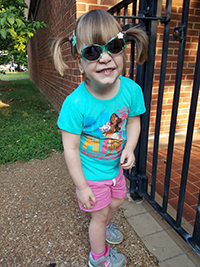 Each year, the Vanderbilt Kennedy Center (TN UCEDD, IDDRC, LEND) facilitates conversations between Vanderbilt students (undergraduate and graduate) and individuals with disabilities and their families. The topics of the conversations change from year to year, and often are selected based on their timeliness and relevance to conversations being held in the Tennessee Legislature and on Capitol Hill. The conversations are recorded and the students craft them into stories. The stories, coupled with personal photographs, are included in an educational booklet that is printed and shared with legislators and policymakers during Tennessee Disability Day on the Hill and at the Disability Policy Seminar in Washington, D.C., each year. Booklets have focused on topics like employment, aging caregivers, living in rural counties, access to health care, and more.
Each year, the Vanderbilt Kennedy Center (TN UCEDD, IDDRC, LEND) facilitates conversations between Vanderbilt students (undergraduate and graduate) and individuals with disabilities and their families. The topics of the conversations change from year to year, and often are selected based on their timeliness and relevance to conversations being held in the Tennessee Legislature and on Capitol Hill. The conversations are recorded and the students craft them into stories. The stories, coupled with personal photographs, are included in an educational booklet that is printed and shared with legislators and policymakers during Tennessee Disability Day on the Hill and at the Disability Policy Seminar in Washington, D.C., each year. Booklets have focused on topics like employment, aging caregivers, living in rural counties, access to health care, and more.
The 2019 issue of Tennessee Kindred Stories of Disability is The Right to Communicate. This topic was selected to support work being done at the federal level to propose a national technical assistance center on augmentative and alternative communication (AAC) and through a national workgroup at the Association of University Centers on Disability (AUCD). The stories come from individuals who have complex communication needs and families living in Tennessee. The individuals we spoke with have conditions like cerebral palsy, intellectual disabilities, autism, Rett syndrome, ALS, TBI, and aphasia. The experiences they share about communication highlight a critical need for communication assessments and access to AAC.
An individual's inability to communicate can cause poor school and post-school outcomes. It increases risk of abuse and neglect, and can cause challenging behaviors. Individuals who cannot communicate their wants and needs effectively are more likely to have health concerns and will likely have trouble getting and keeping a job. They will have decreased independence and fewer connections with communities. In the booklet, you meet Emily (age 5), who loves being around people and playing. Communication is critical to her happiness and to her ability to interact with her peers. In another story, Jim (age 45) shares about being a beta tester on an AAC device that allowed him to type using small movements of his chin. He still uses it today, and it helped him complete graduate school and gain independence. You'll also read about Joshua (age 17), whose father says that more than 50% of his frequent aggressive and self-injurious behavior is caused by communication issues.
The stories point out benefits of undergoing communication assessments to individualize what type of AAC works most effectively, and ultimately drive home the point that everyone deserves to have a voice. Everyone has a right to be heard. The Kindred Stories of Disability project gives future educators, advocates, and researchers an opportunity to learn firsthand from families. It gives individuals with disabilities and families an opportunity to educate their elected officials, and it gives legislators and policymakers an opportunity to understand the impact their decisions might have on their constituents' lives. To browse the collections, visit https://vkc.mc.vanderbilt.edu/vkc/resources/kindred/.
Partners: Vanderbilt Kennedy Center; The Arc Tennessee; The Association of University Centers on Disabilitiesl Vanderbilt University students
Connecting Person Centered Practices with Adult Protective Services
Texas Center for Disability Studies; Austin, TX![]() The Institute on Person Centered Practices at the Center on Disability Studies (CDS) at the University of Texas in partnership with the Texas Adult Protective Services Agency (APS) developed and revised a training curriculum over a five-year period on Person Centered Practices. The primary audience was caseworkers who worked directly with APS clients to resolve abuse and neglect investigations. In addition, regional managers and trainers participated. A Mentor Trainer employed by the Center at the University of Texas and certified by the International Learning Community on Person Centered Practices developed and presented a series of trainings over the five-year period. Training was presented at eight APS regional offices.
The Institute on Person Centered Practices at the Center on Disability Studies (CDS) at the University of Texas in partnership with the Texas Adult Protective Services Agency (APS) developed and revised a training curriculum over a five-year period on Person Centered Practices. The primary audience was caseworkers who worked directly with APS clients to resolve abuse and neglect investigations. In addition, regional managers and trainers participated. A Mentor Trainer employed by the Center at the University of Texas and certified by the International Learning Community on Person Centered Practices developed and presented a series of trainings over the five-year period. Training was presented at eight APS regional offices.
A key objective of the initial curriculum was to provide training for APS caseworkers who are highly skilled at determining and taking action almost exclusively with their clients based on what is important for (health and safety) the person. This introductory training to person-centered practices challenged the learners to shift their interactions during the investigation process to balance what is important to the person equally, to what is important for the person. A large part of this one-day training focused on skill development by practicing person centered thinking skills using case studies in groups and with a partner.
The second phase of the training program called for a curriculum revision that addressed the training needs of APS case workers working with clients that consistently returned for APS services. The revised curriculum utilized person-centered practices to decrease recidivism. This revised training shifted the focus to challenge learners to apply Person Centered Practices with an eye to long-term planning and goal development.
The final phase of this process was to develop a curriculum that would blend person-centered practices with APS procedures. APS invested funding to certify two statewide Person Centered Thinking (PCT) Trainers with extensive experience applying APS policy and procedures. Over a two-year period, the Mentor Trainer with The University of Texas CDS collaborated with the APS PCT Trainers to develop a curriculum with two days of the training. The training included APS specific case studies, hands on and group activities to connect APS procedures to person-centered practices. The curriculum was piloted over a year period at three APS regional offices. The curriculum is now embedded in the APS training rotation, presented by the APS PCT trainers and offered for caseworkers, managers and other staff throughout Texas.
Partners: Texas Adult Protective Services, Jeff Garrison; Institute for Person Centered Practices, Texas Center for Disability Studies
Enhancing Access to Equal Education through Language Access and Cultural Competence in Vermont
Center on Disability and Community Inclusion; Burlington, VT The Center on Disability and Community Inclusion (CDCI) is proud to share our efforts in promoting the right to equal education for students with disabilities, especially those who may also experience language barriers. Our Center has worked to increase language access for New American and English Language Learners within Vermont. Two CDCI projects, The Vermont Interdisciplinary Team (I- Team) and Continence Project, are concentrating these efforts to garner better access to supports and services for school-aged children.
The Center on Disability and Community Inclusion (CDCI) is proud to share our efforts in promoting the right to equal education for students with disabilities, especially those who may also experience language barriers. Our Center has worked to increase language access for New American and English Language Learners within Vermont. Two CDCI projects, The Vermont Interdisciplinary Team (I- Team) and Continence Project, are concentrating these efforts to garner better access to supports and services for school-aged children.
While Vermont is traditionally viewed as a homogeneous state, pockets of vibrant cultural and linguistic diversity exist within some of the state's largest cities. New American and English Language Learning families often face additional barriers to equal education, and when students also need more supports related to a disability, these barriers can lead to even more adverse outcomes including being more likely to be kicked out of the classroom.
The Vermont I-Team and the Continence Projects provide technical assistance and training to educators and teams of professionals who work with students with complex support needs and their families. They work to find solutions to keep students and families present and learning within classrooms. With Vermont's changing demographics, the need to also ensure our ability to work with students and families who are culturally and linguistically diverse also grew. Darren McIntyre, Assistant Director of CDCI and Project Director of both the I-Team and Continence Projects, cultivated relationships with community organizations that could help train and provide resources and services to our team members around language access and cultural and linguistic competency. Partnering with the Association of Africans Living in Vermont (AALV), we have been able to develop a process for families of referred I-Team students, I-Team members, and educational teams to communicate through interpreters, translate consent forms into multiple languages, including Telugu and Somali (based on the needs of families), and work with interpreters to provide technical assistance for families referred to the Continence Project.
This partnership with AALV has also brought translation services and cultural and linguistic competency training opportunities to CDCI as a whole. We hope the small steps taken by our Center and the progress made by the I-Team and Continence Projects will help lead the way to better outcomes and access for historically marginalized groups.
Partners: Association of Africans Living in Vermont (AALV)
Social Justice and Advocacy: Graduates of the Wyoming Institute for Disabilities Minor in Disability Studies Prepare for Disability Leadership
Wyoming Institute for Disabilities; Laramie, WY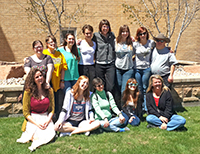 The Disability Studies minor, offered by the Wyoming Institute for Disabilities at the University of Wyoming, engages students in investigating social justice issues related to disability. During their course of studies, students develop contexts to understand disability experience as a fundamental and rich component of human diversity, and to promote the full social integration of people with disabilities.
The Disability Studies minor, offered by the Wyoming Institute for Disabilities at the University of Wyoming, engages students in investigating social justice issues related to disability. During their course of studies, students develop contexts to understand disability experience as a fundamental and rich component of human diversity, and to promote the full social integration of people with disabilities.
Disability studies is a diverse interdisciplinary field that investigates broad questions about the nature, meanings, and consequences of disability from interrelated social, historical, cultural, and political perspectives, including frameworks in:
- humanities perspectives, examining diverse cultural representations and meanings of disability, considering issues such as identity, intersectionality, and normalcy;
- social science frameworks, exploring disability rights and policy including equal rights, social justice, and access to education, health care, supports and opportunities;
- health sciences perspectives, providing biocultural frameworks and integrating the knowledge of people with disabilities into healthcare and pre-professional training.
As students examine disability issues from multiple lenses, they balance theoretical exploration with practical application during a one semester practicum. In partnership with various community organizations, students gain valuable experience working with people with disabilities. These placements include service providers, advocacy organizations, governmental agencies, and schools, and provide students with substantial opportunities to expand their knowledge about disability and gain exposure to professions they are preparing to enter.
Over 110 students have graduated with the University of Wyoming disability studies minor and are poised to become empowered leaders in disability research and advocacy. Disability studies has partnered with numerous regional agencies to provide practicum opportunities for our students. These include:
- ARK Regional Services and Cooper Center for Creative Arts (service provider)
- Albany County Head Start
- Albany County School District #1 - classroom placements
- Transition Academy
- Albany County Developmental Preschool and Day Care
- Cathedral Home for Children (residential youth treatment center)
- Laramie Head Start
- Spring Wind Assisted Living Community
- University of Wyoming Early Care and Education Center
- Wyoming Governor's Council on Developmental Disability
Serving Juvenile and Adult Court Involved People with Disabilities
The Virgin Islands University Center for Excellence in Developmental Disabilities; U.S. Virgin Islands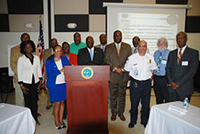 The Virgin Islands UCEDD (VIUCEDD) enjoyed a successful collaboration with the Virgin Islands Police Department and Territorial Senators and The Office of the Governor to ensure increased safety for people with disabilities in their interactions with first responders as well as promoting best practices with for people with disabilities involved in juvenile and adult incarceration settings. VIUCEDD conducted the first disability knowledge training for police and first responders. We taught a class of over 100 new cadets and first responder professionals about topics related to disability awareness, sensitivity, and best practices for working with people with disabilities across disability categories. Our work related to The School To Prison Pipeline was also well received. As a result of a free training that our UCEDD provided to the community, two Senators who attended that training, one in charge of homeland security, organized the first ever Crime Prevention Symposium in which the current Executive Director of VIUCEDD provided the keynote address. This work led to an invitation from the Virgin Islands Government to participate with the National Governors Association on further juvenile justice reform work.
The Virgin Islands UCEDD (VIUCEDD) enjoyed a successful collaboration with the Virgin Islands Police Department and Territorial Senators and The Office of the Governor to ensure increased safety for people with disabilities in their interactions with first responders as well as promoting best practices with for people with disabilities involved in juvenile and adult incarceration settings. VIUCEDD conducted the first disability knowledge training for police and first responders. We taught a class of over 100 new cadets and first responder professionals about topics related to disability awareness, sensitivity, and best practices for working with people with disabilities across disability categories. Our work related to The School To Prison Pipeline was also well received. As a result of a free training that our UCEDD provided to the community, two Senators who attended that training, one in charge of homeland security, organized the first ever Crime Prevention Symposium in which the current Executive Director of VIUCEDD provided the keynote address. This work led to an invitation from the Virgin Islands Government to participate with the National Governors Association on further juvenile justice reform work.
Partners: The office of the Governor; The U.S Virgin Islands Department of Homeland Security; The Virgin Islands Police Department; The Disability Rights Center of the Virgin Islands; and the ADA coordinator to the Governor







